


















The SW Graduate School of Banking at SMU Cox empowers bankers in all positions, other financial services professionals and affiliates, regulators, bank directors, and aspiring bank directors with knowledge and relationships that strengthen careers, organizations, and communities.



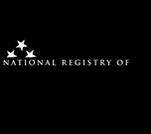





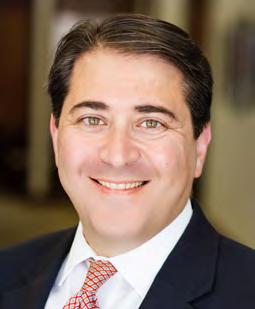


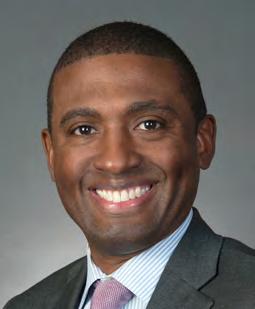




Anthony Nestler Chair Hickory Point Bank & Trust
REGION 1
Miguel Gomez CIBC Bank USA
Maria Tabrizi First Women’s Bank
REGION 2
Peter Brummel Grundy Bank
T. J. Burge Chair-Elect Community Partners Savings Bank
Courtney Olson First Bank Chicago
REGION 3
Lawrence Horvath Heartland Bank and Trust Company
Kathy Williamson Bank of Farmington
Megan Collins Vice Chair Bank of America
Frank Pettaway Treasurer The Northern Trust Company Courtney Olson At-Large Category First Bank Chicago
Amy Randolph At-Large Category Busey Bank
Thomas Chamberlain Immediate Past Chair
Iroquois Federal Savings & Loan Association
Randy Hultgren Secretary Illinois Bankers Association
REGION 4
Scott Bland First Neighbor Bank, N.A.
Brett Tiemann INB, National Association
REGION 5
Ted Macon
Farmers State Bank of Hoffman
Bethany Shaw Peoples National Bank, N.A.
LEADERS ALLIANCE
Ryan Martz Solutions Bank
LARGE
Gustavus Bahr PNC Bank, N.A.
Dave Conterio Hometown National Bank
David Doedtman Washington Savings Bank
Brian Hannon Cornerstone National Bank & Trust Company
Quint Harmon Resource Bank, N.A.
Tom Hough Carrollton Bank
Robert Kelly Old National Bank
Karlie Krehbiel Lisle Savings Bank
Alan Kwasneski Marquette Bank
Amy Randolph Busey Bank
Dalila Rouri BMO Bank, N.A.
Timothy Smigiel Liberty Bank for Savings
Daniel Wujek State Bank of Cherry
Two Offices to Serve You! Springfield Office: 800-783-2265 • Chicago Office: 800-878-2265
To connect with our staff, use this email format: firstinitiallastname@illinois.bank
Executive Administration
Randy Hultgren, President & CEO
Mindy Manci, Executive Assistant & HR Manager
Pam Macha, Springfield Office Coordinator
Finance and Administration
Mark Bennett, CPA, Executive Vice President and CFO
Matthew Keeling, Director Marie South, Financial Assistant
Law Department
Carolyn Settanni, Executive Vice President & General Counsel
Carly Berard, Associate General Counsel
Andrés Sánchez, Staff Attorney Jeavon Greenwood, Administrative Assistant
Government Relations
Ben Jackson, Executive Vice President
Aimee Smith, Assistant Vice President
Matt Imburgia, Director
Member Relations
Julie Winterbauer, Senior Vice President
Tim Robinson, Director, Bank Relations
Illinois Bankers Business & Education Services, Inc.
Callan Stapleton, CAE, EVP & President of Business and Education Services
Adam Walsh, Vice President, Insurance Services
Lyndee Fein, Director, Education & Conferences
Jocelyn Holzmacher, Director of Marketing
Robin Lane, Director, Associate Membership
Rachel Selvaggio, Director, Business and Education Services
Denise Perez, Director, Education & Training
Amy Sale, Education Assistant
Illinois Bankers Group Insurance Trust
Mike Mahorney, Plan Administrator Hillary Meyers, Trust Manager
Ste. 400, Springfield, IL 62704. News items from members of the Illinois Bankers Association are invited and are due on the first of the month preceding publication. © Copyright 2024 by Illinois Bankers Association (unless individual articles
copyright). Reproduction of
material in the Illinois Banker is strictly prohibited without written permission of the publisher.

Congratulations on another strong year for the Illinois banking industry. In 2024, the bankers of Illinois helped businesses of all sizes with loans, treasury management services, and more. We helped individuals and families buy homes and save for the future. We provided crucial financial services to municipalities and not-for-profits, including schools and universities. We supported Illinois’ agricultural economy with reliable financial solutions. We served institutions, foundations, and families as trustees, agents, and financial planners. We provided vital financial and other support for our communities, and our bankers invested countless hours of volunteer time in service to those in need. We did our part to make Illinois a great place to live and work in 2024. Bravo, Illinois banks!
As we embrace a new year, our thoughts turn to plans for the future. Please keep the resources of the Illinois Bankers Association in mind to help you navigate a dynamic industry. The IBA offers robust educational opportunities, ranging from executive education to courses designed for new bankers. Our Regulatory University, a free online platform, keeps your employees informed about changing laws and regulations. The Future Leaders Alliance helps develop the next generation of leadership. The Annual
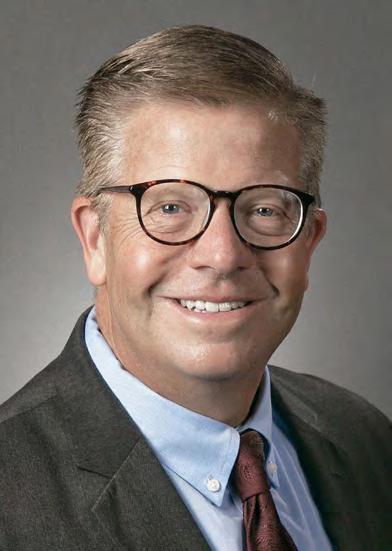
Conference provides a forum for executives from across the state to come together, share ideas, learn together, and have fun.
If you have not considered the Illinois Bankers Insurance Services (“IBIS”) and Adam Walsh, please be encouraged to do so. The IBIS offers a comprehensive suite of insurance products exclusively for banks. This includes Financial Institution bond, property & liability insurance, worker’s compensation, and a full menu of employee benefits. Adam and his team are proactive and bring profound industry-specific knowledge to the table. My personal experience with Adam and the IBIS team has been positive.
Finally, please be encouraged to continue to support the IBA’s advocacy efforts. This may include contributing to the Illinois Bankers PAC, participating in the IBA’s Lobby Day at the state capital, joining the Washington Fly In, or working with IBA staff to enhance dialogue between you and your elected officials. The voice of Illinois bankers is loudest when we speak together.
Thank you for your commitment to the Illinois Bankers Association, and best wishes for a happy and prosperous new year.
Welcome 2025. We have survived another challenging, frustrating, yet rewarding year as bankers. Serving your customers and communities has never been more important, but also, never more difficult. Through it all, know that your Association is here for you. We are fighting difficult battles daily in Springfield, Chicago, and Washington, D.C.
2024 was one of the most aggressively antibanking legislative years in our state. The IBA brought together banks from every region and of every size to push back against the anticonsumer interchange legislation. As Carolyn Settanni, our fantastic General Counsel and EVP, recently said to a reporter: "this Illinois law is going to unleash chaos on Illinois consumers, small businesses and community financial institutions and it is going to happen in a matter of months unless the court steps in, which we have requested. The special interest here is the mega retailers and they are trying to increase their bottom line by forcing the entire payment industry to make this huge change in a way that will benefit mega retailers but won’t benefit smaller players and certainly not Illinois consumers and community financial
institutions.” No other entity could do what the IBA is doing to fight for your bank and our industry. This is just one of the many ways we serve you, help you solve problems, and deliver significant value to our members.
The Illinois Bankers Association exists to support every banker in our state. 2024 was a very good year for the IBA. We broke attendance records at many of our conferences. Commit now to join us in Bloomington on March 13-14 for The ONE Conference to enjoy great networking and speakers, or to take advantage of our effective education resources.
Many of our members are reaping benefits and cost savings by utilizing recommended bank partners. Reach out to Adam Walsh, who runs our Illinois Bankers Insurance Services, to ensure you are getting the perfect coverage at the best price. Tap into our exceptional legal expertise by ensuring that all your key people are using “gotoIBA.com”. Our passion is to serve you, and our most satisfied banks are the ones who use our services the most. Together, let’s make 2025 fantastic!
The IBA Law Department
QUESTION
What is the retention period for charged-off loans, both paid and unpaid?
ANSWER
We recommend retaining any records related to charged-off loans, whether they are paid or are unpaid, for ten years from the date of charge-off.
The Illinois Code of Civil Procedure imposes a ten-year statute of limitations, meaning that a lender generally must initiate collection proceedings within ten years for written contracts (with some exceptions). The Federal Financial Institutions Examination Council (FFIEC) recommends that banks maintain supporting Call Report documentation, including evidence of charge-
QUESTION
offs and recoveries, for three years after the report date. Also, the IRS requires reporting of debt cancellations over $600 on Form 1099-C (or, for some secured loans, Form 1099-A) and imposes a four-year retention period for the form and related data.
Consequently, you may wish to retain documents related to charged-off loans for ten years in case your bank wishes to initiate a collection proceeding for a loan within the ten-year statute of limitations period.
If we have a joint personal account (JTWROS), can we add two authorized signers (not the owners) to the account? I’m not familiar with this practice and wasn’t sure if this is something that is permitted.
ANSWER
We are not aware of any Illinois law prohibiting joint accounts from having one or more authorized signer.
If your internal policies and procedures and your account agreements do not discuss adding authorized signers on joint accounts, we recommend deciding
whether it will be your bank’s policy to require all joint account owners to consent to adding an authorized signer to an account (or to remove an authorized signer). We believe that whether you require the consent of all or only one joint owner is a matter of bank policy.

Can you provide some clarity as to banks’ responsibilities with respect to the changes to the beneficial ownership information reporting requirements set to go into effect on January 1, 2025?
ANSWER
There has been a recent flurry of changes related to FinCEN’s beneficial ownership information (BOI) reporting requirements. However, the BOI changes relate to the rule requiring legal entities created or registered to do business before January 1, 2024, to file beneficial ownership information reports with FinCEN on or before January 1, 2025. Banks are subject to separate customer due diligence (CDD) requirements that require collecting and reporting their customers’ beneficial ownership information, and those CDD requirements remain in place, unaffected by the recent BOI changes.
As to the BOI changes, in December 2024, a federal district court had issued a nationwide preliminary injunction against FinCEN’s BOI rule. On December 23, the Fifth Circuit federal appellate court overruled that injunction, but it quickly reversed that decision on December 26. FinCEN has published an alert on its website confirming that “reporting companies are not currently required to file beneficial ownership information with FinCEN and are not subject to liability if they fail to do so while the order remains in force.”
We received an Illinois Department of Revenue tax levy on an account, which requires us to hold the customer’s assets for twenty days, limited to the amount of the levy. If the levy amount exceeds what is in the customer’s account, can we place a hold for the full amount of the levy, since the customer receives a weekly paycheck that we assume will bring the account funds up to the levy amount within the twenty-day period?
No, we do not believe you should hold funds deposited after your receipt of the tax levy. Rather, we believe you should hold only the funds in your customer’s account on the date you receive notice of the tax levy.
The failure to pay taxes due under the Illinois Income Tax Act creates a lien against a person’s property in favor of the Illinois Department of Revenue in the amount of the unpaid taxes. The Illinois Department of Revenue has the right to levy on accounts held by financial organizations to recover unpaid taxes. The Illinois Income Tax Act also authorizes the Illinois Department of Revenue to levy a person’s wages by serving a notice of levy on their employer, and the Act
expressly provides that the “levy . . . is a lien on wages or other payments due at the time of the service of the notice of levy, and such lien shall continue as to subsequent earnings and other payments until the total amount due upon the levy is paid.”
However, no such express language authorizes financial organizations to hold funds deposited into an account after service of a notice of levy. Consequently, we do not believe your bank should place a hold on funds deposited into an account after receipt of the levy. If the Department of Revenue chooses to attach your customer’s wages, it can do so by serving a notice of levy on their employer.
Our IBA Law Department provides many resources to help our bank members meet their compliance challenges, including a toll-free Compliance Hotline (1-800-GO-TO-IBA) and a dedicated compliance website (www.GoToIBA.com). We also publish a free weekly e-newsletter highlighting the latest regulatory developments, select recent Q&As, and other useful information –let us know if you want to subscribe!
Note: This information does not constitute legal advice. You should consult bank counsel for legal advice, even if the facts are similar to those discussed above.
It’s
By Rob Nichols, President and CEO, American Bankers Association
As we welcome 2025, a new presidential administration and a new Congress, it’s time to reset the conversation around banking regulation.
Over the last four years, the banking industry has battled an onslaught of new rules and regulatory changes that have threatened to fundamentally alter how financial institutions in this country operate.
Regulators have taken a de facto “one-size-fits-all” approach to rulemaking — ignoring the diversity of bank sizes, charters and business models within the banking sector, as well as the undeniable trickle-down effects of regulations that are, on paper, only targeted toward larger institutions. For whatever reason, they have also chosen to pursue rulemakings more tied to the past than the present. It’s time to stop fighting the last war and stay focused on the present and the future.
ABA and the state associations have stepped up on behalf of our members, challenging misguided final rules in court wherever warranted and pushing back with facts and data to stop faulty assumptions from underpinning major regulatory changes and bogus claims about our industry from spreading. We’ve had some notable successes over the last four years, but it hasn't been easy.
As we welcome 2025, a new presidential administration and a new Congress, it’s time to reset the conversation around banking regulation.
That effort began right after the election during the transition, as ABA worked to communicate our priorities to the incoming Trump administration. With leadership changeovers anticipated at the regulatory agencies following the inauguration — including at the FDIC, OCC and CFPB — we expect to have the opportunity to share our perspective with the new players and help refocus the conversation around rightsizing the supervision and regulation of the banking sector.
But while we can expect some of the new regulators to pause some proposed rulemakings altogether, and Congress could use the Congressional Review Act to undo some of the most recent regulatory proposals, it’s important to remember that the new administration and new Congress will not wield a magic wand.
Undoing policy changes in a durable way can take just as long as putting new regulations into place, since the Administrative Procedure Act and its notice and comment procedures apply. As we have noted in our many active lawsuits, regulators have frequently flouted the APA in recent years, and partisan agendas have too often driven a rulemaking process that is supposed to be even-handed and fact-based.


We have the opportunity now to get it right — by following a transparent process and by working constructively to engage policymakers of both parties in crafting commonsense regulations that ensure our banking sector remains safe, sound and well-capitalized. That’s how we bring about meaningful, long-lasting change.
At ABA, we are ready to roll up our sleeves and get to work, together with our state alliance partners — and we need your help.
We need every banker in this country to stay engaged on the issues that matter. Reach out to your members of Congress, particularly in states where freshmen lawmakers are taking office. Get to know your representatives, invite them to your bank and introduce them to your customers and your employees. Help them to understand not just the important work banks do each day, but the ripple effect that the provision of credit can have in our cities, towns and neighborhoods.
Finally, I invite every banker in this country to join us in Washington, D.C. April 7-9 for the 2025 ABA Washington Summit. This year’s annual gathering of bank leaders will be critically important in making sure we have a policy environment that will unleash economic growth and allow banks to serve their customers and communities. We need all of you there to make sure our industry’s voice is heard loud and clear.
E-mail Rob Nichols at nichols@aba.com.
By Ben Jackson, Executive Vice President of Government Relations
You no doubt heard a lot about our advocacy efforts in 2024 because of the interchange issue that we fought in Springfield. We took that fight to the federal courts while continuing to engage lawmakers, the media, and consumers.
Our team has deconstructed this situation ad nauseam. Our Springfield and Washington DC lobbying programs are second to none, yet we always strive to perform better on behalf of our members, the bankers of Illinois who work to improve their communities every day.



Our on-the-ground lobbyist team ensures we have a proverbial “seat at the table,” a powerful voice backed by our members to represent our interests.
We like to think of that seat as a three-legged stool, and each leg represents a different part of advocacy.
If we do not have three sturdy legs on our stool, our seat before government is wobbly and unstable, and your association cannot perform at its highest level of representation on your behalf. Instead, we’re diverting our effort towards balancing that wobbly stool.
The first leg of the stool is the direct lobbying that we do as an association on your behalf. We build relationships, ensure we are knowledgeable about a plethora of banking issues, laws, and regulations, and fight hard for your interests.
The second leg is the Illinois Bankers PAC. We were so pleased that all of you, our members, stepped up to help us reach our goal of $300,000 raised in 2024. That is just a start, and we can and will do more with our PAC to support our political giving and help our allies.
The third leg of the stool is grassroots: the direct involvement of bankers. Ideally, this manifests as hundreds of bankers attending our marquee grassroots events in Springfield and Washington, bankers establishing strong relationships with elected officials, and
bankers contacting their lawmakers on key issues throughout the year.
Grassroots engagement is, right now, our wobbliest stool leg. Your IBA team plans to address this in 2025. We will create new ways for you to connect with lawmakers, we will facilitate relationships with your elected officials, and we will increase the number of energized bankers who attend our advocacy gatherings.
And did I mention these events are fun? Bankers from all levels of your organization will enjoy the networking, policy briefings, and economic updates that are always a part of our grassroots efforts. We are confident that you will enjoy getting involved, while our industry will increase its success in Washington and Springfield.

By Jenn Addabbo, Co-Founder & Chief Executive Officer, EngageFI
Now that the election has concluded, Americans have a clearer sense of the country’s direction over the next four years. Banks will need to reassess their strategies, considering potential policy shifts. A Trump-led administration could bring significant changes that impact regulation, tax policy, and economic growth initiatives. Banks must be ready to navigate the changing tide, reevaluating how these changes may affect their future state.
Over the last four years, under the Biden administration, the financial sector has experienced a climate of regulatory scrutiny, especially surrounding consumer protection. There have been numerous interest rate hikes to combat inflation, followed by inflation control measures, and increased scrutiny of mergers and acquisitions. Financial equity initiatives and fair lending enforcement have also been key initiatives of the administration.
Changing economic conditions have also affected banks, increasing operational costs and customer sentiment. The economic pressures have reshaped customer
financial priorities. Inflation, the top concern for most voters, has reduced savings capacity for many, while rising interest rates have made borrowing less attractive. These changes have forced financial institutions to get creative to remain both profitable and compliant.
As the new administration takes office, financial institutions must prepare for potential policy shifts that could further impact operational strategies, regulatory responsibilities, the economic environment, and customer relationships.
The Trump administration will likely favor deregulation and take a more hands-off approach to oversight. It is rumored that the administration plans to make as many as eight leadership changes on day one to federal regulatory agencies, including the FDIC, if Biden’s nomination isn’t confirmed by year end. Banks will potentially see reduced restrictions and a reexamination of the Dodd-Frank Act or a relaxation of Consumer Financial Protection Bureau (CFPB) mandates. This move could result in reduced compliance costs and more streamlined operations, likely relieving some of the administrative burden on financial institutions.
There may also be changes to corporate tax policy. If so, this move could open up more capital for financial institutions to reinvest in technology, expand lending portfolios, or enhance customer service. On the flipside, if these policies are not accompanied by stable economic policies, there could be volatility, impacting lending and investments.
The removal of regulatory red tape is not without its challenges; it can lead to increased risk-taking and more vulnerabilities. Banks will need to closely monitor and strengthen their own risk management practices. Deregulation can also increase social responsibility pressures; it is essential to continue fairness and equity in lending. Furthermore, reduced regulatory oversight can pose reputational risks; finding the balance between compliance and consumer trust will be paramount.
Potential deregulation could allow banks to grow their current loan portfolios and develop new loan offerings. More operational freedom and greater support of
fintechs in the banking system could spur innovation, allowing banks to expand services and increase their digital footprints. Additionally, as regulations ease, we may see a surge in mergers and acquisitions across the financial services industry.
If new economic policies can successfully reduce inflation (although some experts believe Trump’s plans may do the latter), consumers’ financial confidence is likely to improve, which could encourage more saving and borrowing. A decrease in inflation could also lead to more favorable interest rates, making borrowing more attractive and accessible. Both create opportunities for financial institutions to expand their services and deepen customer relationships.
While it may be hard for banks to predict exactly what the future holds, it is essential for financial institutions to adopt a proactive approach to potential shifts. Prepare now and have your strategic plan in place so your bank is able to navigate the challenges and opportunities the new administration may bring.




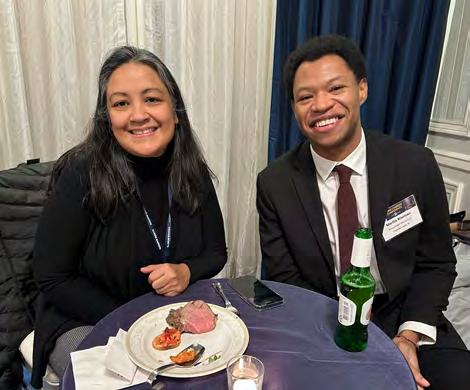
As we step into 2025, we take a moment to reflect on the year we’ve left behind. 2024 tested our resilience and showcased our strength as bankers. Serving Illinois communities and customers remained as vital as ever, even in the face of mounting challenges.
Looking ahead, we are excited about everything the Illinois Bankers Association (IBA) has to offer. From advocacy and lobbying efforts to compliance support and educational opportunities, your association remains the go-to resource. At the IBA, we focus on three key pillars: Education, being an Industry Resource, and Advocacy.
Our education team works closely with bankers across the state, alongside the Education Services Board and numerous committees, to create engaging content and valuable opportunities. With more than 15 peer groups, 50 full-day seminars, five schools, and 10 conferences, we are committed to providing quality education and networking opportunities to help you grow in your careers.
As an Industry Resource, we partner with 16 Preferred Vendors who specialize in helping bankers evaluate and perform due diligence on solutions designed to enhance

profitability, reduce costs, and improve operational efficiency. We are proud to offer two insurance solutions. Illinois Bankers Trust Health Insurance program ensures exceptional care for your team’s health insurance needs. The Illinois Bankers Insurance Services work exclusively with banks offering tailored coverage across all business lines to comprehensively protect your organization.
Another invaluable resource we provide is BankTalentHQ, a nationwide career center. This platform connects banks with top-tier talent for job openings while equipping job seekers with the tools and resources they need to thrive in the banking industry.
Advocacy remains at the heart of our mission. Throughout the year, we stood firmly by your side, advocating for our industry at every turn. In Springfield, Chicago, and Washington, D.C., we tackled some of the toughest legislative battles we’ve ever faced. Among the most pressing issues was the fight against anti-consumer interchange legislation. Banks from every region and of every size came together under our leadership to push back. On December 20, a federal judge issued a preliminary injunction against enforcement of the law. This significant victory marked an important step forward, but the fight is far from over.
One of the most impactful ways to strengthen our advocacy efforts is through the Illinois Bankers PAC, a vital, nonpartisan Political Action Committee created to champion banking interests through political engagement. A strong PAC amplifies our collective voice in shaping government decisions, ensuring the future of banking is safeguarded against unique regulatory challenges.
As we embark on 2025, we are deeply grateful for your membership, partnership, and trust in the IBA. Together, we have demonstrated that unity makes us stronger, enabling us to rise to challenges, seize opportunities, and uphold the values that define and strengthen our industry. We look forward to another year of shared success, progress, and unity!
New Bank Members
Fidelity Bank
Villa Grove State Bank
Heritage Bank of Schaumburg
New Associate Members
All Covered, IT Services from Konica Minolta
Allied Payment Network
Automated Systems, Inc.
BAFS-Business Alliance
Financial Services
BEVYTEC, LLC
Bosch Security Systems LLC
Cathcap
CHAMP Titles
Computershare, Inc.
Consolidated Communications
CorServ, Inc.
Country Banker Systems, LLC
Darling Consulting Group
DefenseStorm
Duane Morris LLP
Finastra
Finzly
Growers Edge
Implemify
Integra Software Systems, LLC
MeridianLink
Midwestern Securities Trading Company

OnBoard
Quantalytix
Quantum
Round Hill Technologies (DBA
Ned)
Security Alarm
Southwestern Graduate School of Banking Foundation
Stephens
Superior Informatics LLC
TechGuard Security
The NBS Group, LLC
Tipton Systems




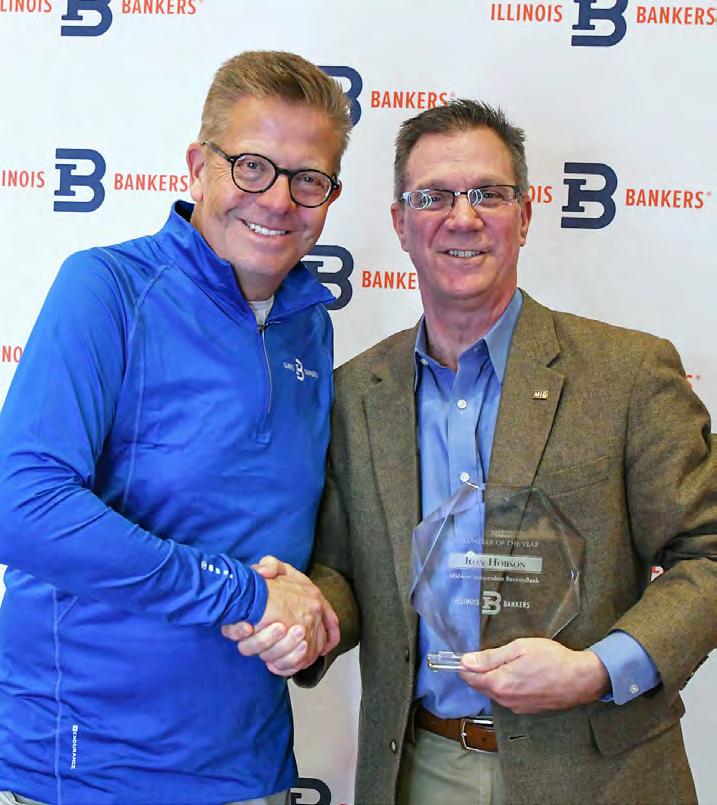
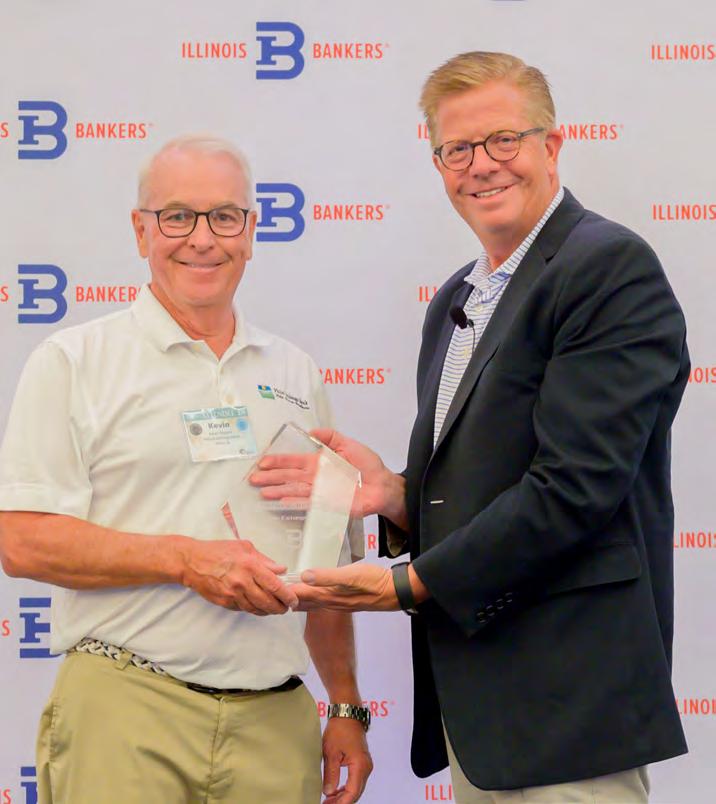
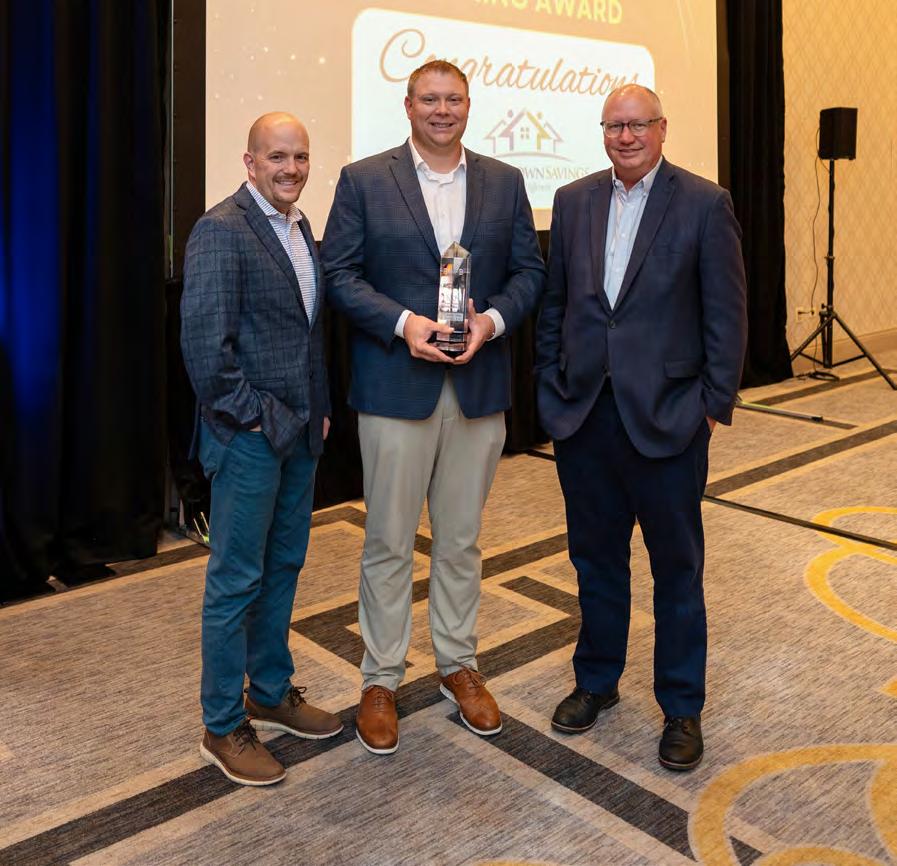

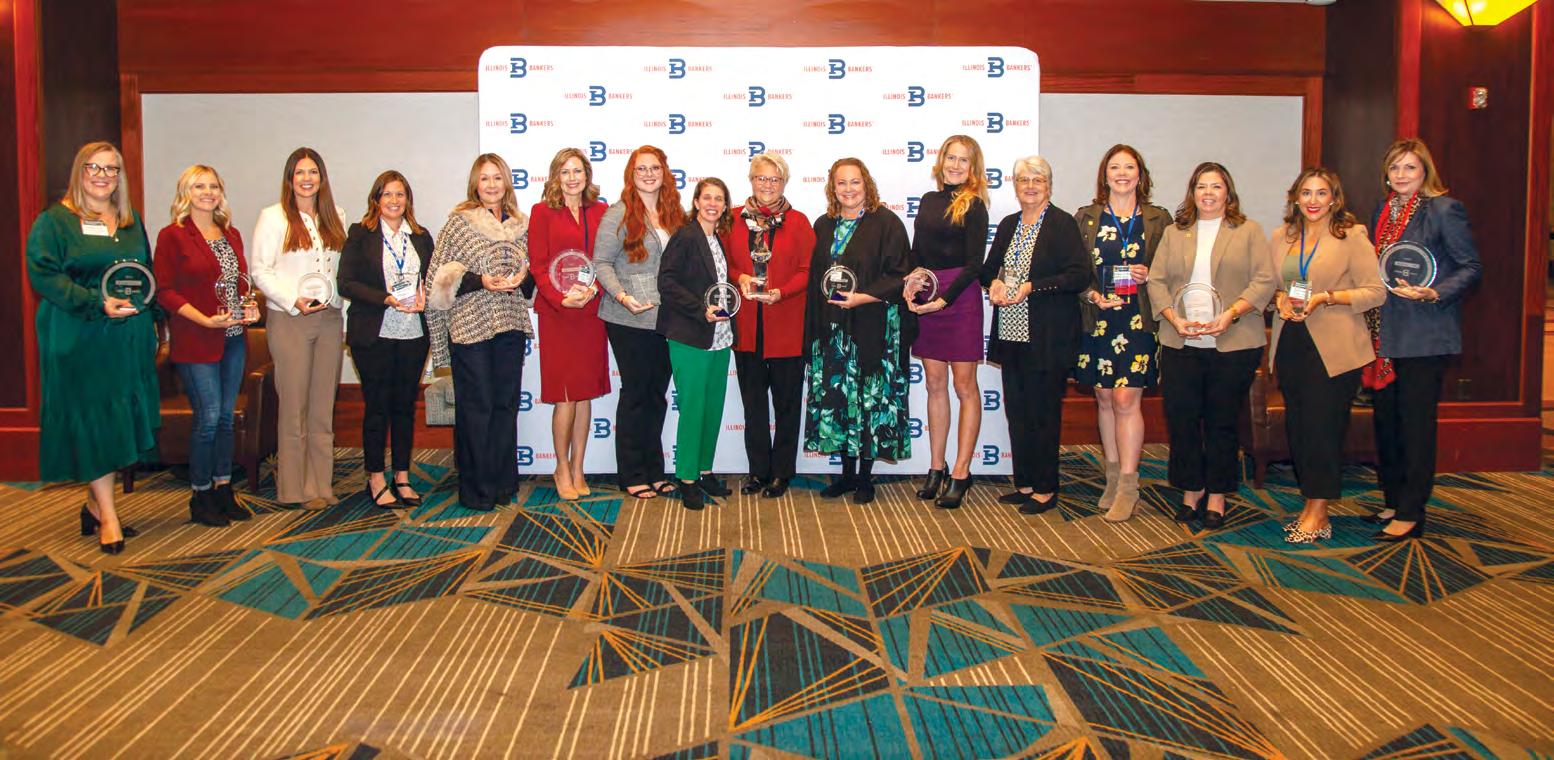


Rick L. Catt
First Robinson Savings Bank, N.A.
Merle E. Coile
Anchor State Bank
John W. Conrad
The Frederick Community Bank
James R. Eckert
Anchor State Bank
Carol Jo Fritts
First Neighbor Bank, N.A.
Ronald G. Klein
Resource Bank, N.A.
James M. Roolf Old National Bank
Joseph M. Silveri Hickory Point Bank & Trust
Ronald N. Welch INB, National Association
Murphy-Wall State Bank and Trust Company
Pinckneyville
150 Years (1874-2024)
2024 LINDA J. KOCH SCHOLARSHIP RECIPIENTS

Trace Donnan
PORTA High School/Augustana College
Sponsored by Petefish, Skiles, & Co. Bank

Ava Harwood
John Hersey High School/Indiana University, Kelly School of Business Sponsored by The PNC Financial Services Group, Inc.
Streator Home Savings Bank
Streator
130 Years (1894-2024)
2024 ILLINOIS BANKERS SCHOLARSHIP RECIPIENTS

Prospect High School/Indiana University Sponsored by PNC Bank

Bushnell Prairie City High School/ Spoon River College Sponsored by Farmers & Merchants State Bank
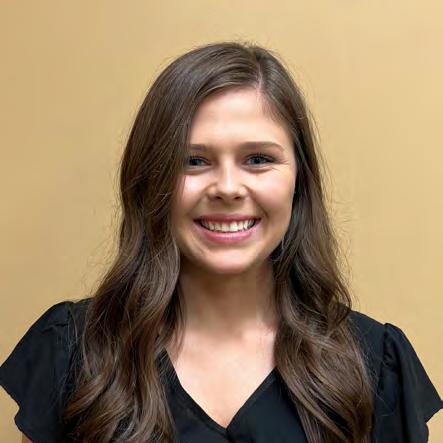
by Peoples National Bank

2024 Contributions raised: $328,835
2024 Disbursements made to state, local, and federal candidates: $426,925
Member banks contributed: 40%
ROCKSTAR CONTRIBUTORS
Bank & Trust Company
Central Bank Illinois
Community Savings Bank
Cornerstone National Bank & Trust Company
First National Bank of Steeleville
First National Bank of Waterloo
First Women's Bank
Grundy Bank
Iroquois Federal Savings & Loan Association
Philo Exchange Bank
Solutions Bank
State Bank of Bement
State Bank of Cherry
The First National Bank of Litchfield
FAIR SHARE CONTRIBUTORS
Amalgamated Bank of Chicago
Belmont Bank & Trust Company
Buckley State Bank
Busey Bank
Central Federal Savings and Loan Association
CIBC Bank USA
Community Partners Savings Bank
DeWitt Savings Bank
Farmers & Merchants State Bank of Bushnell
First Mid Bank & Trust, N.A.
First Neighbor Bank, N.A.
First Security Bank
First State Bank
First State Bank of Campbell Hill
FNBC Bank & Trust
Holcomb Bank
Hometown National Bank
Iroquois Farmers State Bank
FAIR SHARE CONTRIBUTORS
Ag Resource Management
BigIron Auctions
Consolidated Communications
Credit Bureau of Muscatine, Inc.
Floodplain Consultants, Inc.
ICI Consulting Inc.
Lisle Savings Bank
Marquette Bank
Marion County Savings Bank
Midland States Bank
Millennium Bank
Nashville Savings Bank
NorthSide Community Bank
Pan American Bank & Trust
Peoples National Bank, N.A.
Quad City Bank and Trust Company
Republic Bank of Chicago
Security Savings Bank
Sterling Bank
Stillman BancCorp N.A.
The State Bank of Pearl City
Washington Savings Bank
CONTRIBUTORS
Alliance Community Bank
American Bank and Trust Company, N.A.
American Community Bank & Trust
Associated Bank, NA
Bank of America
Bank of Belleville
Bank of Farmington
Bankers' Bank
Beardstown Savings, sb
Blackhawk Bank & Trust
Byline Bank
Carrollton Bank
CBI Bank & Trust
Citizens Community Bank
Community Bank of Elmhurst
Farmers National Bank
First Bank Chicago
First Farmers Bank & Trust Company
First Security Trust and Savings Bank
Forest Park National Bank & Trust Company
Heartland Bank and Trust Company
Hickory Point Bank & Trust
Home State Bank, N.A.
Hometown National Bank
Hoyne Savings Bank
INB, National Association
Itasca Bank & Trust Company
Lakeside Bank
Liberty Bank for Savings
Metropolitan Capital Bank & Trust
Midwest Independent BankersBank
Morton Community Bank
North Shore Trust and Savings
Old National Bank
Old Second National Bank
OSB Community Bank
Peoples Bank
Peoples Bank of Kankakee County
Prospect Bank
Sauk Valley Bank & Trust Company
Signature Bank
The Central Trust Bank
The Litchfield National Bank
TIB, N.A.
UMB Bank, n.a.
U.S. Bank N.A.
United Bankers' Bank
Union Federal Savings and Loan Association
Village Bank & Trust, N.A.
Wells Fargo, NA
Wintrust Bank, N.A.
interface.ai
Ironcore Inc
NFP Executive Benefits
Reich & Tang Deposit Networks LLC
RSM US LLP
Tecniflex LLC
Virtual Innovation, Inc.
EVENT SPONSORS
Banc Consulting Partners
BancMac - Community Banc Mortgage Corp
Engage fi
Fiserv, Inc.
Midwest Independent BankersBank
Olsen Palmer LLC
Erich Bloxdorf
Thomas Broeckling
Thomas Chamberlain
John DuBois
Gerald F. Fitzgerald Jr.
James Hannon
Mark Hoppe
Thomas Hough
Suzanne Hough
Thomas Hughes
Randy Hultgren
Betsy Johnson
Robert Koopman
Kenneth Kruse
Chad Kullberg
Dennis Lutz
Rick Parks
Amy Randolph
Matthew Sitkowski
Michael Steelman
Mark Svalina
Maria Tabrizi
Adam Walsh
GOLD CONTRIBUTORS
Doretta Alms
Mark Bennett
Darl Bollman
Peter Brummel
Kathleen Cook
Brian Dao
David Doedtman
Lenus Eggemeyer
Andrew Fehlman
John Greenwood
Brian Hannon
Gary Hemmer
Casey Hicks
Daniel Hollowed
Patrick Horne
Lawrence Horvath
Tom Hough
Eric Johnson
Mark Kleine
John Kozak
Phil Kunz
Jeffrey B. Lang
Mark LaPlantz
David Luther
Daniel Lutz
David Mehrmann
Joshua Miller
Chris Milne
Jared Nobbe
George Obernagel
Denise Olds
Kevin Olson
Shelley Perkins
Kent Redfern
John Richards
Aimee Smith
Daniel Stein
Klay Tiemann
Matthew Wilcox
Kathy Williamson
SILVER CONTRIBUTORS
Samuel Banks
Jeffrey Boundy
Todd Burns
Christopher Breyman
David Brozovich
John Callahan
Michael Cassens
Robert Conrardy
Tami Coss
Trent Cox
Drew Dethrow
Thomas Dunker
Rich Eckert
Philip Elfrink
Cindi Eustice
Steve Gerstenberger
Andrew Gerth
Brian Goebbert
Michelle Gross
Matthew Hladio
Robert Hoffmann
J. Michael Holloway
Dan Iza
Karen Jacobus
Amanda James
Jeff Johnson
Blake Johnson
Alice Jost
Stephen King
Gregory Kistler
Thomas MacCarthy
Mindy Manci
Randy Matravers
Joshua McConachie
Janis Miller
Michael Minton
Gary Nation
Anthony Nestler
Courtney Olson
Elizabeth Otto
William Parks
Samantha Patrick
Annette Pickrel
Jim Roolf
Frank Roth
Douglas Sanders
Michael Schell
Thomas Schlink
Christine Shultz
Timothy Smigiel
John J. Smith
Ashley Speed
J.P. Stein
Scott Swisher
Thomas Tesdal
Bruce Uchtman
Whitney Valdivia
Jeffrey Vohs
Denise Ward
Scott Wehrli
Michael Wickkiser
Kenneth Wright
Mailyn Abella
Eric Adcock
Jaclyn Aldridge
Eran Allan
Andrew Ambrose
Robert Ambrose III
Julie Amundsen
Michael Bagniewski
Amanda Bohlen
Richard Brown
Michelle Carroll
Tom Chester
Erin Cohn
Patricia Colwell
Rhonda Dalton
April Davis
Jeffrey De Bruin
Sarah Dolan
Kelly Dransfeldt
Kerry Duellman
Emily Duncan
Tim Eischeid
Ashley Evans
Sanford Fleck
Alberta Fleming
Nicole Fluhart
Brandy Foster
Konstanze Fowler
Cindy Fultz
Darin Gehrke
Gary Genenbacher
Angelique Gerlock
Mallori Giesegh
Maria Godina
Miguel Gomez
Sharon Gorrell
Cindy Greene
Connor Gross
Craig Gustafson
Lon Haines
Jeff Haycraft
Phillip Hayes
Larry Helling
Patrick Hennelly
Brittany Herman
Linda Hessenberger
Ron Hobson
Jake Hopkins
Rhonda Houzenga
Brandt Hutchcraft
Joshua Ishmael
Teresa Johnson
Wes Johnson
Dawn Kelley
Erin Kennedy
Kristin Kimmel
Kristin King
Chris Knight
Stephen Lear
Mindi Lehman
Tasha Lovelace
Ted Macon
Greg Maher
Ryan Martz
Tom McIntire
Gina Meier
Dirk Meminger
Stefany Mickelson
Elizabeth Miller
David Mitchell
Bob Mizeur
Addie Moranville
Erick Mueller
Georgia Pelletiere
Joan Peterka
Jennifer Pittman
Susan Poling
Rhonda Ranker
Stacy Raven
Amie Ries
Richard Riggins
Kraig Ritter
Kevin Rogers
Dennis Romero
Steven Rosenbaum
Brenda Rupert
Christopher Schneider
Brittney Shepherd
Joseph Silvia
Karen Soll
Debbie Steele
Heather Steger
Robert Stroh, III
Adam Turner
Jack Vainisi
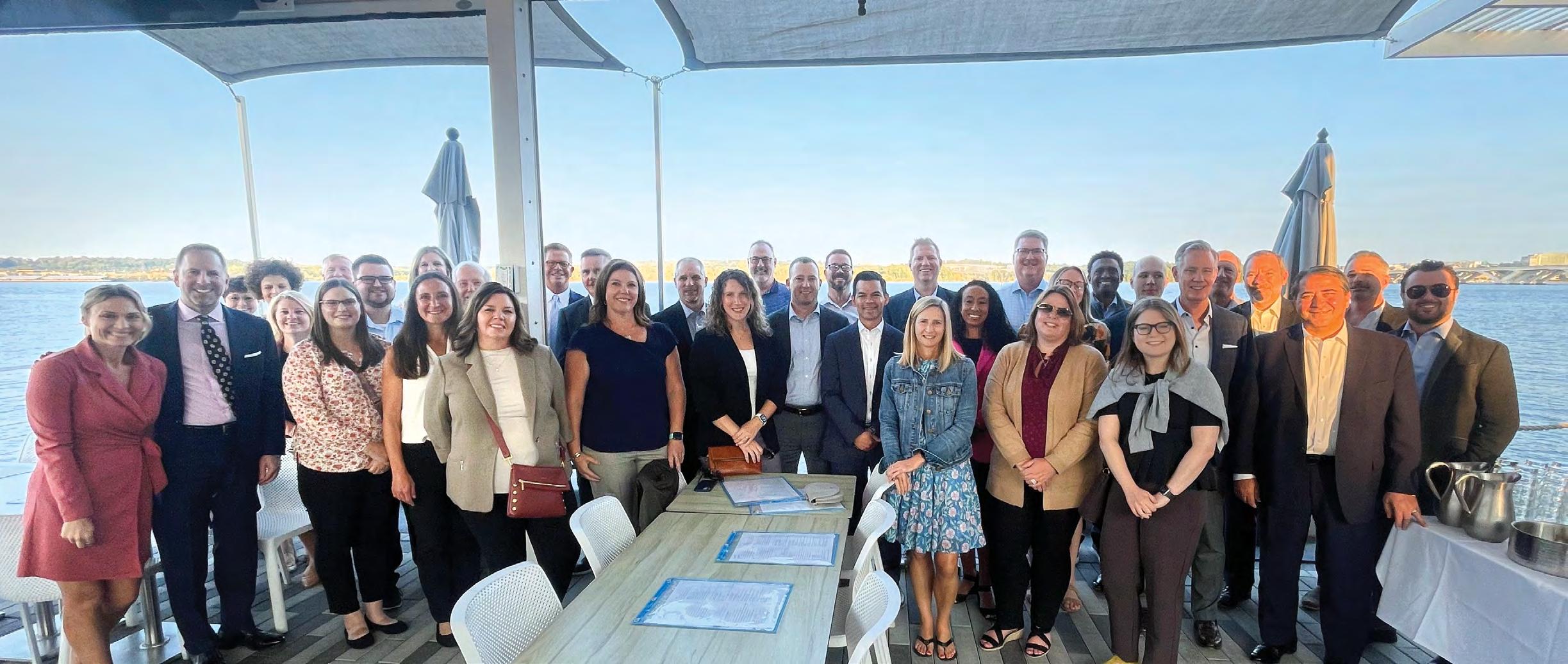
Peter Vogel
Blake Williams
Daniel Wujek
Abigail Yowell
Many financial institution executives spend considerable time thinking about strategies to improve efficiency in order to improve overall profitability.
The efficiency ratio is the ratio of non-interest expenses (less amortization of intangible assets) to net interest income and non-interest income, so it is effectively a measure of what you spend compared to what you make. The very name – “efficiency ratio” – makes us think about how efficient we are with those precious income dollars. If a financial institution has a high efficiency ratio, they are simply spending too much of what they make…right? That is exactly what the name implies (emphasis on the spending side of the equation). But this is just a ratio of two numbers, and as we all know, there are two ways to bring the ratio down – reduce costs or increase revenues.
The focus across industry press and conference best practices is generally aimed at strategies to cut expenses –using technology, looking at staffing levels, increasing productivity, etc. Although this advice is sound, what happens when a financial institution has already cut what can be cut AND
By Dr. Sean Payant
it is still struggling with efficiency? It is sometimes difficult to save your way to prosperity.
For many financial institutions, the focus should also be on the bottom portion of the equation – increasing revenues. Let’s look at an institution that has $500 million in assets, a good return at 1% ROA, and a reasonable efficiency ratio of 60%. Let’s assume the FI can improve its efficiency ratio by 5% through revenue increase or expense reduction.
It shouldn’t be surprising that increasing revenues provides better performance even though this sometimes seems like a counterintuitive approach. Because many financial institutions need to increase investments for growth in order to significantly grow their revenues, thereby increasing the expense side of the equation, and because of their excess capacity, this will actually make them more efficient over time. Many financial institutions have cut expenses almost to the bone and can’t materially improve their efficiency ratio by further reducing costs. They need to take a step back and realize some fundamental business dynamics that are often ignored in our industry.
Most community financial institutions still have tremendous excess capacity, meaning they could serve significantly more customers without significantly increasing expenses. The answer to improving the efficiency ratio is to fill excess capacity with brand NEW profitable customers.
How do other businesses look at the issue of excess capacity – for example a manufacturing company?
• The facility is running at 50% of the capacity it was built to produce;
• The factory has done everything it can to be as efficient as possible – evaluate staffing levels, implement technology solutions, etc.; and
• Management’s major goals and objectives are still focused on improving profitability by further evaluating already efficient processes and selling more to current customers.
Given the excess capacity at the manufacturing company, wouldn’t it also make sense to evaluate if more widgets can be run through the facility? Would the market support providing more products to more people in order to increase net income without substantially increasing expenses?
The manufacturing company analogy is very similar to the situation being faced by community financial institutions. They have branches currently attracting 30% - 50% of the new customers they were built to serve each year and it is getting worse as transaction volume continues to decline in branches.
Most financial institutions have used technology and staff reductions to become more efficient; however, they still spend much of their time, effort and energy focusing on cost reductions and additional efficiency enhancement.
When a community financial institution starts welcoming significantly more new customers per year, fixed costs do not substantially change – no new branches have been built, no additional employees have been hired. Actual data from hundreds of community financial institutions illustrates the impact on actual expenses is just the marginal costs – generally an additional $30 - $50 per account per year (even if we must mail a paper statement). Conversely, the same data base shows the average annual contribution of each new account per year is between $250 - $350.
When comparing clients that have embraced this strategy to the overall industry over a three-year period of time (2014 to 2017), their improvement in efficiency ratio was 63% better. This has been accomplished by significantly increasing the number of new customers coming in the front doors of existing branches.
There is only so much blood in a turnip. Controlling costs, embracing technology to reduce process costs and evaluating staffing are all things financial institutions should be doing; however, if they have already become very efficient in these areas, the focus must shift to driving revenue. Most financial institutions have tremendous excess capacity in their existing branches today. The solution is to start filling them up.
Sean C. Payant, Ph.D., is Chief Strategy Officer at Haberfeld, a data-driven consulting firm specializing in core relationships and profitability growth for community-based financial institutions. Sean can be reached at 402.323-3614 or Sean@haberfeld.com.


By Jackie Marshall, CISM
For financial institutions (FIs) of all asset sizes and complexity of products and services, maintaining cyber preparedness is a daunting task against increasing cyber threats, reliance on third-party vendors, and ongoing personnel changes. Information Security Officers (ISOs) are tasked with augmented duties to enhance visibility and accountability in protecting non-public information and financial transactions across all business lines.
This article highlights some of the evolving complexities of the ISO role, including the heightened management of third-party relationships, improved reporting to boards and stakeholders, and thorough risk assessments of projects and third-party entities.
In response to the evolving reliance on trusted third-party service providers, federal bank regulatory agencies released new third-party risk management guidance in June 2023. This guidance is intended to help FIs manage risks associated with third-party relationships more effectively, including those involving key technology service providers like financial technology (FinTech) partners. It emphasizes risk management throughout the life cycle of third-party relationships, from planning and due diligence to contract negotiation, ongoing monitoring, and termination.
Since the life cycle includes the preengagement stage, institutions need to
place more emphasis on scrutinizing potential third parties because auditors and examiners will be looking more closely at what happens prior to engagement. The scrutiny should start at the early phase when bank management begins to consider a project, initiative, or even a concept.
Financial institutions also need to understand the strategic basis or purpose of a proposed business arrangement. They should identify and assess the benefits and risks associated with the arrangement and then verify that they align with their strategic objectives. They also must consider other crucial areas, including the institution’s ability to manage and oversee the relationship, the legal and regulatory compliance implications of the relationship, along with the third party’s financial
condition, business experience, expertise of key personnel, and operational resilience. Additionally, institutions need to be cognizant of how third parties are managing their own subcontractors, which could ultimately impact the delivery of their services.
The heightened regulatory emphasis on third-party risk management requires additional time and attention to vet and oversee these relationships effectively. Therefore, many institutions are increasingly adopting automated third-party management tools as a strategic solution to aid the Information Security Officer and other management personnel. These application-based tools facilitate tasks such as risk ranking, control assignment, and due diligence reviews to designated "vendor managers" within particular departments or functions. Utilizing these tools is advantageous in facilitating a consistent approach among stakeholders to manage the risk of third-party relationships.
The Gramm-Leach-Bliley Act (GLBA) first brought to the forefront the importance of establishing the role of an ISO for financial institutions. However, the significance of this role has only magnified as information technology has become essential to every department and business function within an FI. The exposure of customer non-public information (NPI) has exponentially increased with the widespread adoption of online transactions, mobile banking, and third-party relationships.
Managing information security risks effectively requires collaboration. Each stakeholder group, including end-users, IT management, IT Steering Committee, Executive Management, Risk/Audit Committees, and the Board of Directors, plays a crucial role in supporting and executing information security standards. Segregating duties between IT management and the ISO is one of the biggest challenges for many FIs. For those that lack a formal infrastructure, the FFIEC provides guidelines showing how an ISO can and should collaborate with IT management.
In addition, ISOs must break down silos and communicate clearly with all the various stakeholders. This effort requires access to relevant, actionable, and up-to-date information that aligns with each group’s distinct reporting needs, engagement level, and technical understanding.
ISOs may also need to broaden the scope and frequency of their communications. For instance, it is a good best practice to meet with the Board more frequently than once a year. Board members will benefit from periodic discussions with the ISO and IT management to accurately and quickly identify potential issues related to risk
such as inconsistent server backups, software patches, and systems nearing EOL. A comprehensive understanding of Human Resources standards and their impact on information security is also important to ensure that policies and procedures are consistent across the organization.
To facilitate and ensure these meetings and conversations are effective, ISOs should rely on industry-standard frameworks that can be customized for audiencebased agendas and repeatable tasks. Essentially, ISOs should be transparent in communicating changes that could result in increased risk to NPI.
Overall, this can be a challenging effort, especially for smaller banks who may not have the expertise or the time to ensure a consistent approach to governance and communication. For this reason, many FIs choose to partner with a reliable Virtual Information Security Officer (VISO) service. These third-party services provide strategic guidance and the necessary oversight to ensure comprehensive information security management.

IT auditors and federal and state examiners are scrutinizing strategic changes and verifying that FIs sufficiently plan for and execute new service delivery channels and technology initiatives. Therefore, the ISO must play a role in the institution’s strategic IT planning to ensure change and
project management are taken from a consistent risk-based perspective. They should be involved early in assessing risks associated with new initiatives and third-party services, ensuring alignment with overall business goals and adequate preparation for potential cyber threats or operational disruptions.
It is important to note that much of the discussion around recent and future guidance stems from inadequate due diligence of fintech relationships and the lack of overall understanding of how FI customers may be exposed to a breach of thirdparty partner systems.
As institutions navigate these increasingly complex regulatory and cyber landscapes, the role of the ISO has never been more critical. They are now more pressed to proactively manage critical thirdparty relations, improve reporting structures, and execute risk-based assessments of potential projects and strategic initiatives. To meet these expectations, ISOs must increase strategic engagement and delegate tactical work to other resources, which has encouraged many institutions to implement automated applications or VISO services. These solutions can be effective in supporting ISO’s success and ensuring the long-term cyber and operational resilience of the institution.






























Join us at the ONE Conference, the premier professional development event for Illinois bankers!
With seven dynamic tracks, a bustling marketplace, and endless networking opportunities, the stage is set for you to learn, connect, and shine alongside industry leaders.
Earn a FREE registration when you register three!
Bloomington-Normal Marriott Hotel & Conference Center | 201 Broadway, Normal, IL Rate: $159 | Deadline: Feb. 21
Consider traveling with Amtrak! The station is conveniently located one block from the conference center.



















JOHNNY CROWDER
Johnny Crowder, founder and CEO of Cope Notes, is a mental health advocate and entrepreneur dedicated to employee wellbeing. A trauma survivor and Certified Recovery Peer Specialist, he shares practical self-care tools and strategies to enhance emotional health. Recognized by Upworthy, CNN, and Forbes, Crowder inspires through TEDx talks, public speaking, and his metal band, Prison.

APRIL LEWIS
April Lewis, President and CEO of A. Lewis Academy, Inc., champions employee experience and leadership development. Guided by her mantra “Human first, Employee second,” she prioritizes well-being and transformative change. A combat Army veteran of Operation Iraqi Freedom, April embodies resilience and adaptability. As a keynote speaker and consultant, she has impacted Fortune 100 companies across healthcare, banking, and more.

& adjust models if needed for a declining rate environment
By John McQueen
In a declining market interest rate environment, financial institutions should monitor income models’ non-maturity deposit assumptions and thoroughly review the betas and lag factors assigned to each non-maturity deposit account. Otherwise, history suggests the model may be substantially inaccurate.
Time deposits are way up
Total time deposits as a percent of total deposits nearly doubled from the second quarter of 2022 to the first quarter of 2024. Negotiable order of withdrawal and other transaction accounts as a percent of total deposits increased during 2022 but decreased in 2023 and 2024. Money market and savings accounts as a percent of total deposits declined steadily from 2022 to the first quarter of 2024.
This migration of deposit balances out of non-maturity deposits and into time deposits altered many banks’ repricing and cash flow characteristics. This alteration ultimately impacted the interest rate risk measurement.
If the interest rate risk model did not accommodate the shift in deposit balances, the model estimates did not fully account for that risk.
Adjust income simulations if appropriate
Institutions must now consider how a decrease in short-term interest rates will alter the mix of their deposits. If an institution is apt to cut offering rates on CDs in step with a reduction in market interest rates, will CD balances leave the institution? If so, how much will they leave, and when will they leave? Conversely, if an institution maintains above-market rates on CDs, will there be a “surge” of new deposits from other institutions? If so, how much will CD balances increase, and how will that impact the net interest margin?
We recommend thoroughly reviewing:
• All CD accounts, particularly those accounts that are new to the institution and where the depositor has no other relationship with the institution.
• All deposit balances over the FDIC insurance limit of $250,000. Those balances should be considered volatile and should be modeled separately.
Then, adjust your income simulations to consider the possible runoff of at least a portion of those balances. If your institution’s strategy is to offer above-market rates to increase deposits, income simulations should consider the change in beta and balance decay brought on by these new deposits.
Also, ask yourself, do the beta assumptions in the declining market interest rate scenarios match the bank’s current practices or expectations for adjusting deposit offering rates? Suppose the beta assigned to an institution’s money market accounts in the declining market interest rate scenarios is 0.50 with a lag of 90 days. That means if market interest rates decline instantaneously by 100 bps, money market account offering rates will decrease by 50 bps 90 days after market interest rates change. If the institution plans to cut its money market account offering rates by more than 50% of the change in market interest rates as soon as those rates change, then the beta and lag assumptions used in the model are inaccurate.
Conversely, if the institution plans to delay cutting the offering rates on money market accounts for fear of
sparking a runoff in account balances or migration of account balances into higher-costing deposit accounts, those beta and lag assumptions are also inaccurate.
Like loan prepayment assumptions, stress-testing the nonmaturity deposit beta and lag assumptions lets you gauge the model’s sensitivity. The results of these stress tests can be used to make recommendations for any possible changes in beta and lag assumptions.
Disclosure: This communication is provided for informational purposes only. UMB Bank, n.a. and UMB Financial Corporation are not liable for any errors, omissions, or misstatements. This is not an offer or solicitation for the purchase or sale of any financial instrument, nor a solicitation to participate in any trading strategy, nor an official confirmation of any transaction. The information is believed to be reliable, but we do not warrant its completeness or accuracy. Past performance is no indication of future results. The numbers cited are for illustrative purposes only. UMB Financial Corporation, its affiliates, and its employees are not in the business of providing tax or legal advice. Any materials or tax‐related statements are not intended or written to be used, and cannot be used or relied upon, by any such taxpayer for the purpose of avoiding tax penalties. Any such taxpayer should seek advice based on the taxpayer’s particular circumstances from an independent tax advisor. The opinions expressed herein are those of the author and do not necessarily represent the opinions of UMB Bank or UMB Financial Corporation.
Products, Services and Securities offered through UMB Bank, n.a. Capital Markets Division are: NOT FDIC INSURED | MAY LOSE VALUE | NOT BANK GUARANTEED

By Carl White

Cybersecurity, regulation, and technology and funding costs are community bankers’ most pressing current concerns, according to an annual survey that covers the economic, regulatory, competitive and operational challenges they face.
The findings are part of the 2024 Conference of State Bank Supervisors (CSBS) Annual Survey of Community Banks (PDF). The survey, conducted by CSBS and state bank regulators, aims to take the pulse of the nation’s community banks—institutions with less than $10 billion in assets. This year, nearly 370 community bankers from 38 states participated; about two-thirds of participants represented banks with assets between $100 million and $1 billion. The report also contains wide-ranging comments on survey topics from five selected community bankers.
As in last year’s survey, cybersecurity was the top challenge for surveyed community bankers, with 96% of respondents naming it as an “extremely important” or “very
important” risk; that share was up slightly from 93% in the 2023 survey. Funding costs and regulation followed with 89% of respondents reporting them “extremely important” or “very important.” The funding costs percentage was similar to last year’s total, but regulation rose from 81% in the previous year’s survey. Net interest margins and core deposit growth were other top risks linked to the highinterest rate environment of the last two years.
Technology implementation and costs were cited as high risks by 80% of bankers. Liquidity still ranked as a top risk with 78% of respondents indicating that it was either an “extremely important” or “very important” risk, but that was down from 84% in 2023. Still, liquidity was considered a top risk by just 35% of respondents in 2022, evidence that the economic environment weighs prominently in perceptions of risk.
The 2024 survey revealed that community banks are more frequently partnering with fintech firms to provide services
to their customers. In 2023, 59% of respondents reported they had no relationship with a fintech firm, but in 2024, that proportion had declined by nearly half, to 32%. Bankfintech partnerships are most common for services such as mobile banking support, loan origination and underwriting, and other process improvements, including fintech hubs.
Although community banks were largely able to keep deposit balances stable in 2024 after a turbulent 2023, stiff competition meant the costs of those deposits—both transaction and nontransaction—spiked. Bankers reported that other community banks are still their primary competitors for transaction (e.g., checking accounts) and nontransaction accounts, but regional and national banks and credit unions have made inroads in competing for transaction accounts.
Bankers have relied more on wholesale funding, such as brokered deposits, Federal Home Loan Bank advances, other borrowings and reciprocal deposits as deposit competition has
While 40% of respondents said that use of the Federal Reserve’s emergency facilities, such as last year’s Bank Term Funding Program, carried “high” or “very high” stigma, that percentage dropped to 25% for the Fed’s discount window advances. The Fed has made a number of changes to discount window operations over the past 20 years to lessen stigma, and the federal financial institution regulatory agencies have updated guidance (PDF) encouraging depository institutions to incorporate the window as part of their contingency plans.
The CSBS Annual Survey of Community Banks provides valuable insights into the opportunities and challenges facing the nation’s community banks—insights that are valuable to bankers, their regulators, and the business and academic communities. In addition to the survey, CSBS produces the quarterly Community Bank Sentiment Index, which tracks community bankers’ outlook on the economy. While the results for the third quarter of 2024 marked the first positive reading since the fourth quarter of 2021, the industry faces several headwinds that will keep regulators closely monitoring credit quality, liquidity and overall profitability in the months to come.
This post is part of a series titled “Supervising Our Nation’s Financial



Make informed financial decisions with ease with our depository interest rates data and to source for branch level rates for over 75% banks and credit unions in the U.S., offering insight into local competitors, market rate national pricing trends.

By Rica Dela Cruz and Hussain Shah, Market Intelligence
Illinois community banks reduced the rate they pay on one-year certificates of deposits at the same pace as their US peers following the Federal Reserve's interest rate cuts.
Since September, the Fed has lowered the federal funds rate by a total of 75 basis points to 4.75%. The average one-year certificate of deposit (CD) rate at Illinois community banks declined 8 bps from Sept. 13 to Nov. 29, the same as the national community bank average, according to S&P Global Market Intelligence data.
Despite the similar pace of reductions, the average rate that community banks in Illinois paid on one-year CDs, at 1.91%, was lower than the national community bank average of 2.39%.
Given the Fed rate cut and an improvement in the quality of deposit inflows, US banks reported a deceleration. Market Intelligence research projections in funding cost increases in the third quarter showed that community banks' funding costs likely peaked in the same period, though institutions will find it challenging
to quickly lower deposit costs because of their reliance on CDs for funding.
Byline Bank, the largest community bank in Illinois in terms of assets, kept its one-year CD rate unchanged at 0.50% as of Nov. 29. The Byline Bancorp Inc. subsidiary expects a period of adjustment on the CD rate-changing front based on the Fed's next move.
"Our CD book is roughly five months ... so we're going to have a little lag depending on what the Fed does," CFO Thomas Bell III said during an Oct. 25 earnings call. "Obviously, if they do 25 basis points, [it is] more gradual for us and that will be less painful. But when we have a 50 basis point cut, it's going to take a while for us to catch up on that on the CD front."
Among the 15 largest community banks in Illinois, First American Bank reported the biggest drop in one-year CD rate, a decrease of 130 bps to 2.0%. Banterra Bank, meanwhile, marketed the highest rate of 4.19%, while Old Second National Bank and Lakeside Bank offered the lowest at 0.10%.
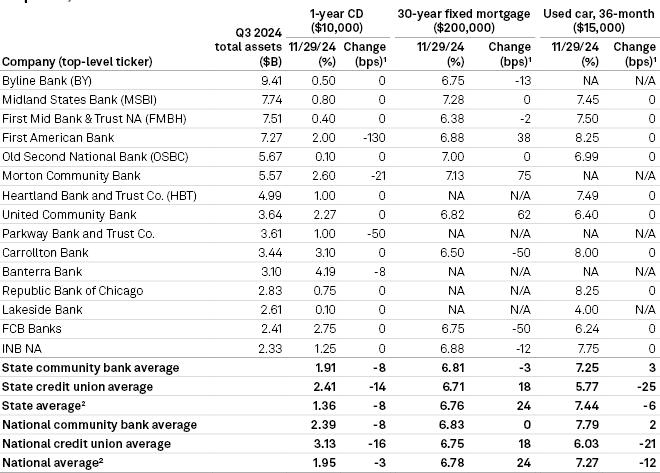
On 36-month used car loans, Illinois community banks were offering an average rate of 7.25% as of Nov. 29, up 3 bps from Sept. 13. The national community bank average rose 2 bps to 7.79%.
US banks' auto loan delinquency ratio was 3.13% in the third quarter, up from 3.05% in the prior quarter, according to Market Intelligence data. So far in the fourth quarter, new and used car industry sales have been resilient, but macro and industry developments could affect auto affordability, J.P. Morgan analyst Rajat Gupta wrote in a Dec. 2 note.
First American Bank and Republic Bank of Chicago offered the highest rate on 36-month used car loans among the 15 largest community banks in Illinois at 8.25% each. Lakeside Bank had the lowest rate at 4.0%.
The average 30-year fixed mortgage rate at Illinois community banks declined 3 bps from Sept. 13 to Nov. 29 to 6.81%. The rate is lower than the national
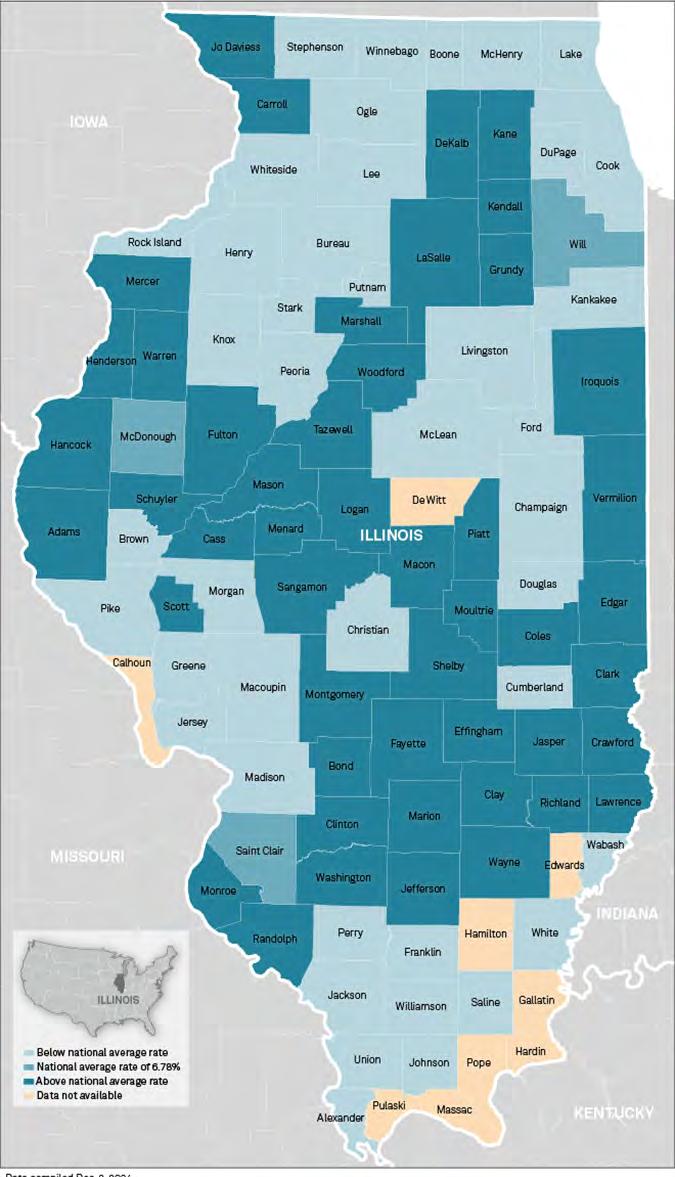
community bank average of 6.83% but higher than the US average of 6.78%. Potential homebuyers are facing increased pressure as US mortgage rates climbed throughout November and remain elevated, a separate Market Intelligence analysis found.
Midland States Bank offered the highest rate on a 30-year fixed mortgage among the largest Illinois community banks at 7.28%, unchanged from Sept. 13, while First Mid Bank & Trust NA was marketing the lowest rate at 6.38%.
During the week ended Nov. 29, the 30-year fixed mortgage rate offered in Jasper was the highest among the counties in Illinois at 7.38%. The rate marketed in Wabash, Cumberland and White was the lowest at 6.38%.
For 15-year fixed mortgage rates, the one offered in Lawrence was the highest among the Illinois counties at 7.0%. Wabash offered the lowest rate at 5.94%.
The national average 15-year fixed mortgage rate during the period was 6.17%, the same rate marketed in Moultrie, Illinois.
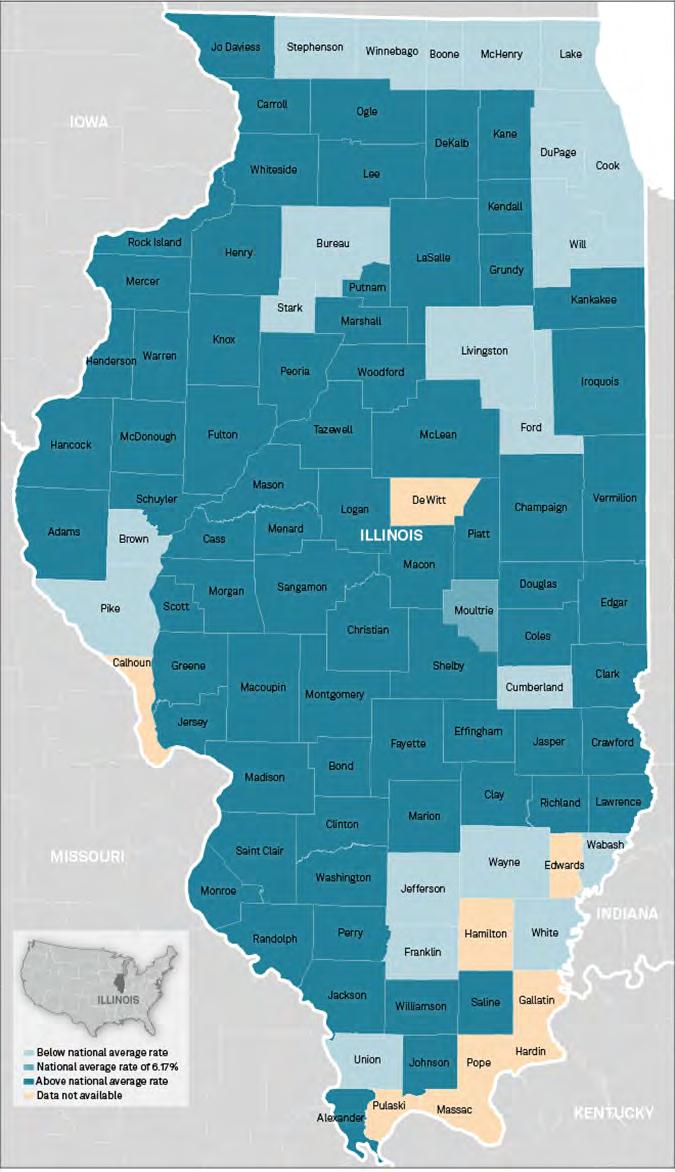


On December 5, the Chicago Area Chapter hosted its annual Holiday Breakfast in Lombard, bringing members together to celebrate the season and explore a critical topic shaping the future of banking. The event combined networking, Chapter business updates, and an engaging keynote presentation.
The morning started with a delicious breakfast buffet, offering attendees the chance to connect with colleagues and industry peers. Following breakfast, the chapter's business meeting provided updates on initiatives, upcoming events, and opportunities to engage with the group.
The highlight of the morning was the keynote address delivered by Chad Knutson, CEO and Co-founder of SBS CyberSecurity and the SBS Institute. As a certified expert in cybersecurity and risk management, Knutson presented on the transformative potential of artificial intelligence (AI) in the banking industry. His talk outlined the strategic opportunities AI presents while addressing its inherent risks. Knutson emphasized that AI has the potential to revolutionize banking operations, fraud detection, and customer experience, but organizations must carefully navigate its adoption to ensure security and ethical use.
The Chicago Area Chapter Holiday Breakfast successfully blended camaraderie, professional growth, and thought leadership. Attendees departed not only with holiday cheer but also with valuable knowledge to navigate the future of banking.
Mark your calendars for the 2025 Chicago Area Chapter Holiday Breakfast on December 4!


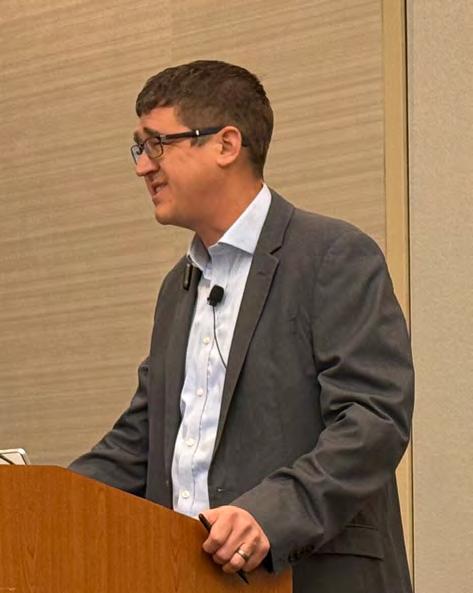



The Illinois Bankers Association is pleased to offer scholarship opportunities to its member bankers through the Herbert V. Prochnow Educational Foundation, a supporting organization to the Graduate School of Banking at the University of Wisconsin –Madison. The GSB Prochnow Foundation offers more than $175,000 dollars in scholarships every year to bankers who want to improve their careers and organizations through education.
Scholarships are distributed through the IBA for the Graduate School of Banking and the GSB Human Resource Management School.
Apply today for a scholarship to attend a program at the nation’s leading and most progressive banking school. For details, contact Denise Perez at the Illinois Bankers Association at dperez@illinois.bank.
SPONSORED BY:

On November 14, Illinois bank executives gathered in Chicago for the highly anticipated Midwest Bank Leaders Conference. The day kicked off with a light lunch and networking, allowing attendees to connect and exchange ideas before diving in.
Our conference emcee Mick O'Rourke, CEO of Signature Bank, set an optimistic tone for day’s discussions. The first presentation featured an engaging update from Van Dukeman, Chairman and Chief Executive Officer of First Busey Corporation and Busey Bank, who shared his insights on trends, challenges, leadership and strategic growth.
Next, Tony Scavuzzo from Castle Creek Capital explored investment philosophies and partnership strategies. He shared insider perspectives on mergers and acquisitions, emphasizing the critical role fintech plays in shaping the future of community banking.
Jim Morrissey, Shareholder and Co-Chair of the Financial Institutions Group at Vedder Price, provided a timely post-election analysis of bank mergers and acquisitions (M&A) and regulatory matters, particularly focusing on community banks. His insights into how
recent election outcomes could influence the banking landscape were both informative and thought-provoking.
Mischa Fisher then took the stage to analyze changes in microeconomic factors resulting from the last economic cycle. His presentation highlighted what remains unchanged in consumer conditions and the housing market while offering forward-looking advice to help attendees navigate future economic challenges.
The day concluded with an engaging session led by Peter Roskam, former U.S. Congressman. He discussed the implications of recent elections for the banking sector, providing valuable insights into anticipated policy changes and regulatory shifts that could impact institutional strategies.
We extend our gratitude to our speakers and attendees who prioritize knowledge sharing within the banking community and foster strengthened relationships through their participation in this conference.
Mark your calendars for the 2025 Midwest Bank Leaders Conference on November 6 at the Gleacher Center in Chicago!

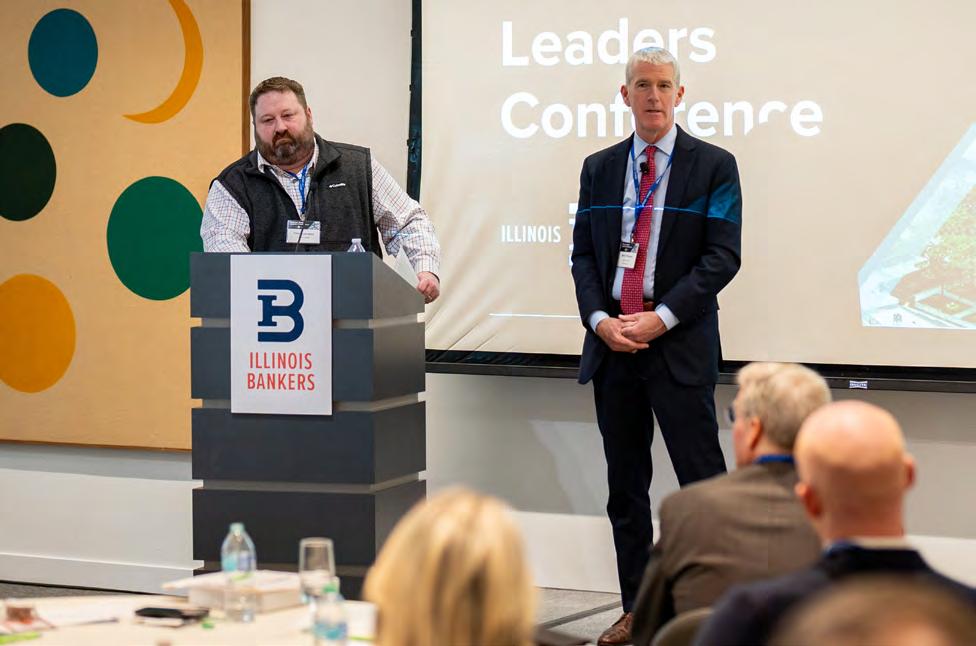
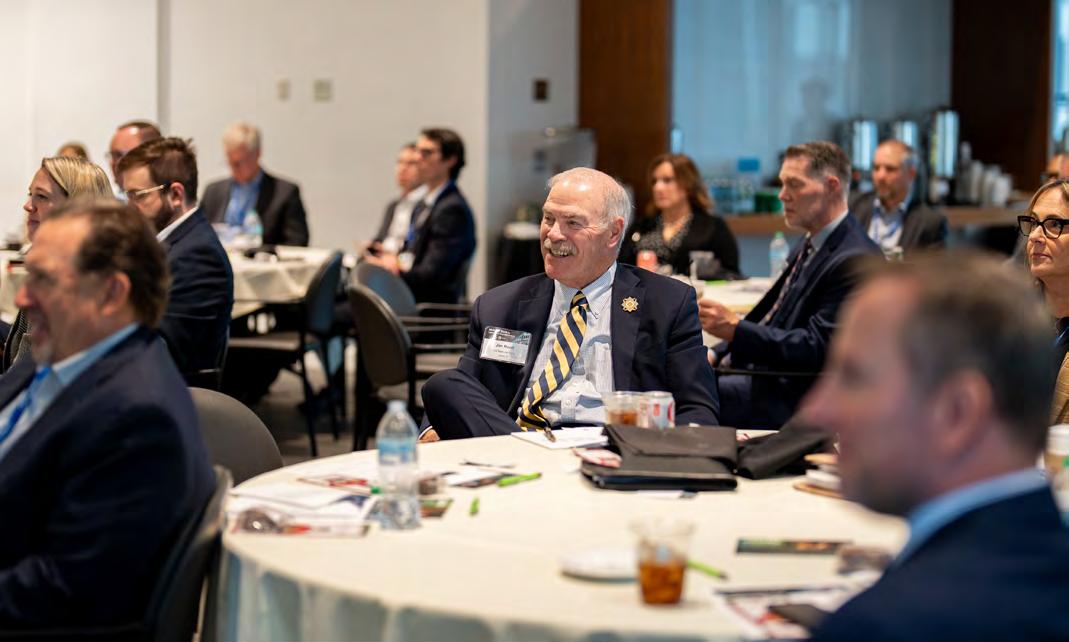



The 2024 Bank Counsel Conference, held on December 6 at the iconic Drake Hotel in Chicago, once again proved why it remains the premier gathering for Illinois banking law professionals. After a year marked by regulatory shifts and economic challenges and a presidential election promising seismic changes for banking regulation, the conference delivered a wealth of insights, robust discussions, and valuable networking opportunities.
The event began with Carolyn Settanni, Executive Vice President and General Counsel at the IBA, presenting her annual Illinois Update on recent developments in Illinois (and federal) banking law. Topics included new interchange fee restrictions, a Uniform Commercial Code (UCC) rewrite for digital assets, and administrative rules implementing the Illinois Community Reinvestment Act (Illinois CRA), among many other topics on Illinois and federal laws, regulations, cases, and guidance.
The Regulatory Roundtable featured senior representatives from the IDFPR, Federal Reserve Bank of Chicago, OCC, FDIC, and CFPB, addressing issues such as the recent U.S. Supreme Court decisions on National Bank Act preemption and the relationship between Congress and federal regulatory agencies, Illinois CRA exams, electronically signed loan documents, check fraud, and more. Panelists also provided valuable agency updates, forecasting potential changes with the new presidential administration.
Margaret Liu of the Conference of State Bank Supervisors led a compelling session on how banks can plan for the future amidst federal administrative law challenges and recent financial services and administrative Supreme Court decisions. Ryan D. Israel of Meeks, Butera & Israel PLLC followed with a timely discussion on how the new presidential administration could reshape banking agency priorities, regulatory frameworks, and compliance requirements.
Robert J. Lewis of Sidley Austin LLP explored trends in commercial lending, covering several recent court decisions, UCC legislation, lien creation and perfection, documentation practices, and more. Marc P. Franson of Chapman and Cutler LLP concluded the day with a session on recent developments in consumer financial services, distilling trends and identifying takeaways
in current and proposed consumer regulations, enforcement, and litigation trends.
The 2024 Bank Counsel Conference equipped attendees with tools and knowledge to address the coming year’s challenges. With expert speakers, timely topics, and vibrant networking, it remains a must-attend event for bank counsel in Illinois.
Plan to attend the 2025 Bank Counsel Conference on Friday, December 5!
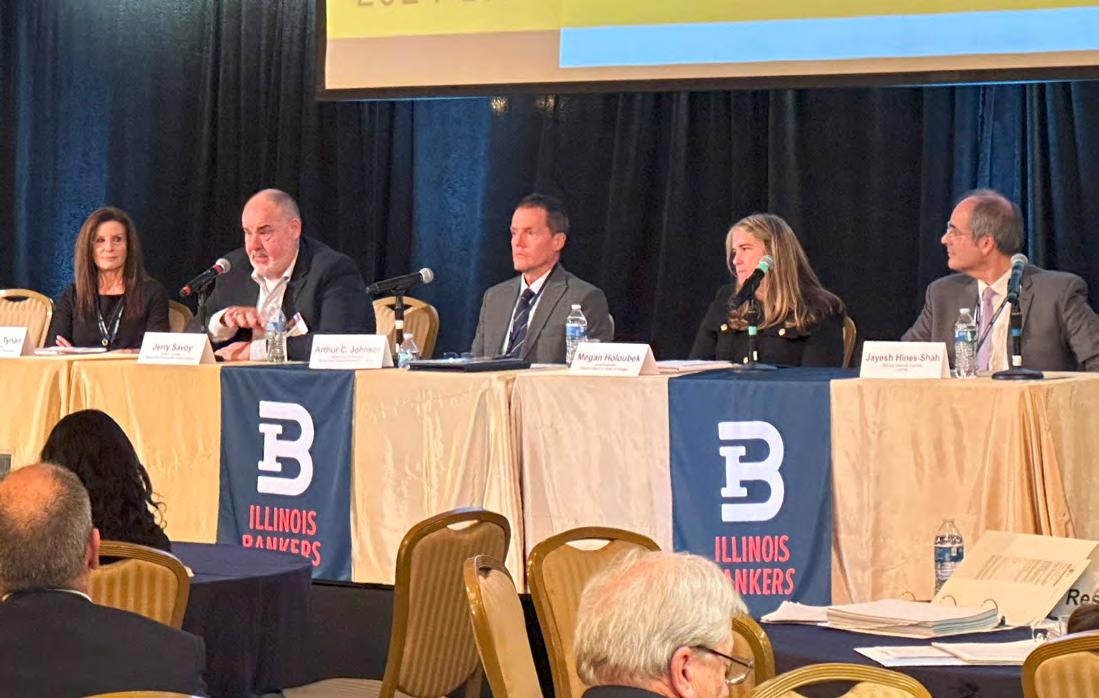


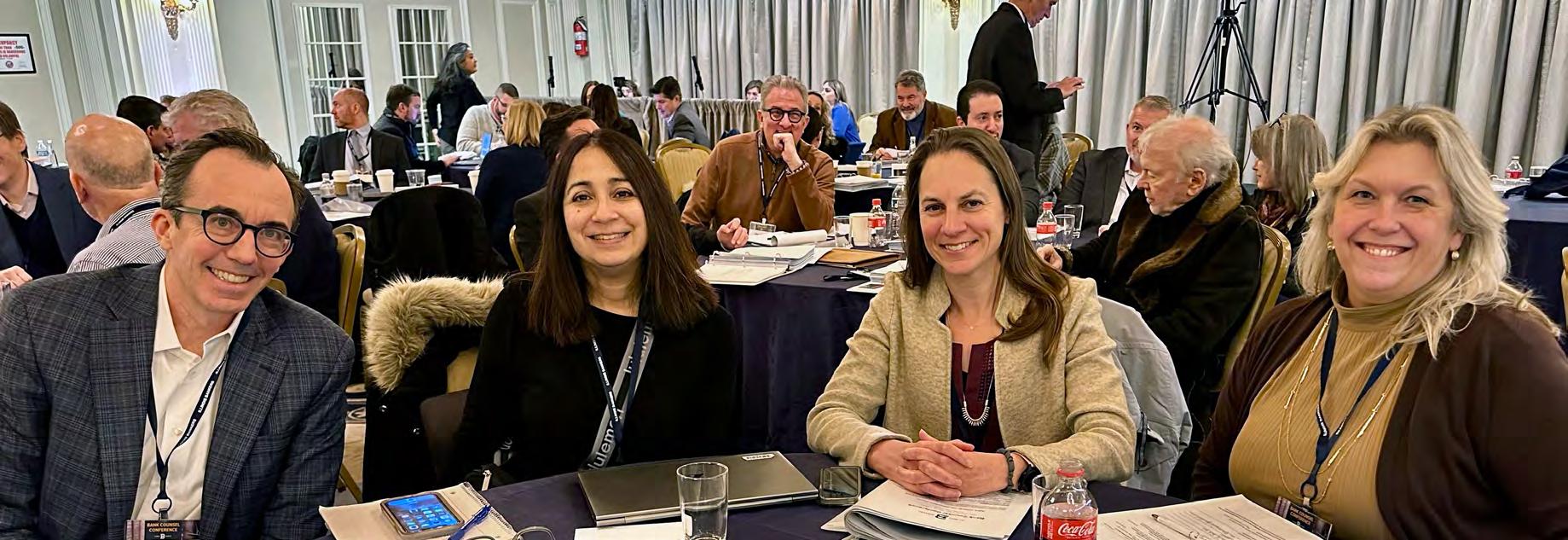


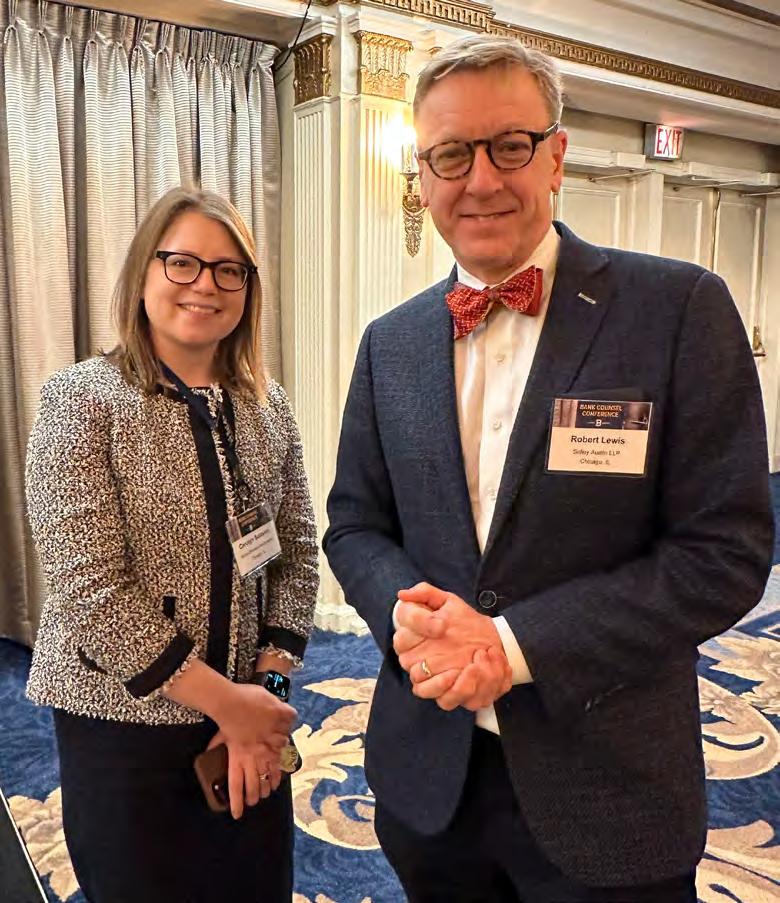



BEVYTEC, LLC
5075 Peachtree Pkwy, Ste 107-168 Norcross, GA 30092-6506
770-840-2700
www.bevytec.com
Contact: John Collins, john@ bevytec.com
BEVYdoc provides transparency and insights throughout the loan process by improving communication and efficiency for all stakeholders from application to closing. With better tools including dashboard views of real-time data, management has the ability to make better decisions.

Consolidated Communications
2116 S 17th St. Mattoon, IL 61938-5973
217-235-4424
www.consolidated.com
Contact: Jason Hanlon, jason. hanlon@consolidated.com
Consolidated Communications provides data, internet, voice, cybersecurity, managed and hosted cloud and IT services to business customers.

Implemify
651 S Sutton Rd., Ste 180 Streamwood, IL 60107-2366
847-800-1902
www.implemify.com
Contact: Tarang Gandhi, tarang@ implemify.com
Implemify is an IT strategy consulting firm specializing in digital transformation, workflow automation, and CRM services. Their goal is to streamline business operations through no-code and low-code solutions, enabling companies to enhance efficiency and productivity. Implemify offers a variety of services, such as IT managed services, strategic consulting, and IT staff augmentation. A key focus is helping businesses adopt digital technologies, leveraging platforms like Salesforce and Creatio, a no-code solution that allows organizations to build custom workflows and applications without needing extensive technical expertise. This partnership enables clients to maximize the flexibility and functionality of their business systems, fostering innovation and growth. Implemify primarily serves small and midmarket businesses but also caters to larger enterprises, providing tailored solutions to meet diverse business needs.
Gone are the days of needing separate software for each type of lending. The Integra 3-in-1 platform “Epic”, covers the lending process from A-Z for Mortgage, Consumer, and Commercial loans on one, single platform. Epic also provides you with a tailored, borrower Point of Sale (POS) for all loan types on your institution website.

Southwestern Graduate School of Banking Foundation
3150 Binkley Avenue, Suite 324 Dallas, TX 75205
214-768-2991
www.swgsb.org
Contact: David Davis, ddavis@smu.edu
Integra Software Systems, LLC
117 Seaboard Ln., Ste F290 Franklin, TN 37067-2857
615-595-0900
www.integraloantech.com
Contact: Adelaide Farrar, afarrar@ integraloantech.com
Integra Software Systems is a Lending Platform Provider providing loan automation for community banks and credit unions since 1996.
Since 1957, the SW Graduate School of Banking at SMU Cox has empowered executives with learning that extends far beyond the classroom. They offer exceptional educational experiences for bank leaders, regulators, and directors of all levels. Through ever-evolving curricula and programming, SWGSB at SMU Cox gives graduates the necessary connections, insights, and expertise to support thriving careers that advance the banking industry.

TechGuard Security
1722 Corporate Xing Ste 1 O’Fallon, IL 62269-3744
636-489-2230
www.techguard.com
Contact: Sarah Illig, sarah.illig@ techguardsecurity.com
For your comprehensive protection in today’s cybersecurity landscape, a dual approach is crucial. Proactive services identify vulnerabilities before exploitation, while defensive services offer continuous protection against emerging threats. TechGuard Security combines these strategies to provide a comprehensive solution that safeguards against breaches and ensures rapid response.
This holistic approach is vital for educational institutions facing sophisticated cyber threats and complex compliance requirements. Cybersecurity built for banks and finance, TechGuard’s clients enjoy a clear roadmap with solutions specific to their needs identified through our assessment process. With a tailor-made roadmap outlining the steps to continued integrity of your cybersecurity, you can be confident in your infrastructure, customer data, and business operations.
Experience: With years of experience serving the banking and finance sector, they have a proven track record of delivering top-notch cybersecurity solutions.
Expertise: Their team of cybersecurity experts stays ahead of emerging threats and trends, ensuring that your institution remains protected against evolving risks.
Partnership Approach: Your trusted partner in cybersecurity, working closely with you to address your unique challenges and objectives.

CBI Bank & Trust Welcomes John Clark as Executive Vice President, Private Wealth Group

CBI Bank & Trust is pleased to welcome John Clark as Executive Vice President, Private Wealth Group, effective November 1, 2024.
Clark brings a deep expertise to his new role, having spent over 35 years in the banking and financial services industry. Most recently, he served as Executive Vice President, Cogent Private Wealth for Cogent Bancorp, Inc.
A graduate of the University of Missouri-Columbia, Clark holds a Bachelor of Science in Finance.
“We are thrilled to welcome John to our team. With his extensive experience leading Private Wealth, he brings a fresh perspective that aligns perfectly with our goals for growth and innovation” said Doug Sanders, Executive Vice President, Chief Operating Officer, CBI Bank & Trust.
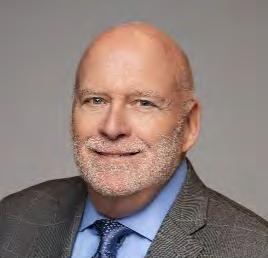
Nationally recognized Merchants Bank continues to expand their Chicago footprint with the recent hiring of John Forssander, a seasoned Mortgage Loan Originator well-versed in the market. Forssander will work on the Merchants Mortgage team that currently operates out of the company’s Illinois offices.
In his new role, Forssander will be tasked with advising clients and potential customers on their home financing needs, providing a range of mortgage loan options. He will also have the opportunity to leverage his existing network throughout the Chicago market and be a valuable asset to both customers and the bank as a whole.
Forssander brings over 25 years of mortgage banking experience to Merchants’ team. His most recent experience includes serving as a senior mortgage advisor at ACB Mortgage Group where he was responsible for managing a construction loan portfolio, processing loan advances and reductions, tracking insurance and more.
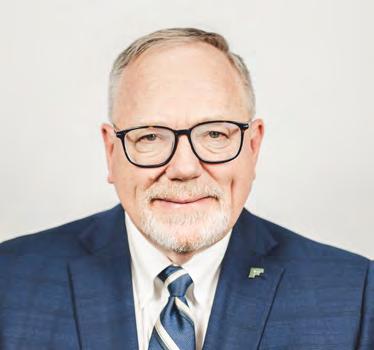
Iroquois Federal recently announced that the Board of Directors of Iroquois Federal unanimously elected Walter “Chip” Hasselbring, III Chairman of the Board. Mr. Hasselbring succeeds Gary Martin, who reached the age limit established by the Board of Directors in the company bylaws, and retired from his position as Chairman of the Board on November 25, 2024, immediately prior to the Company’s

Annual Meeting of Stockholders. Gary Martin joined the Board in 1985 and was elected Chairman on 1/19/2000.
“On behalf of the Board, I would like to thank Gary for his many contributions and dedication to the Company and Association as Chairman. The Company and the Association have benefited tremendously from his expertise, leadership and integrity,” said Mr. Hasselbring. “I look forward
to continuing to work with our highly skilled and dedicated board and management to execute on our strategic priorities.”

In accordance with the Company’s Corporate Governance Guidelines and to provide effective oversight and independence of the Board, the Board appointed Joseph A. Cowan as Lead Independent
Director. Mr. Cowan has served as an independent director of the Company and the Association since 2000.

In conjunction with these changes, Mr. Hasselbring resigned from his position as President of Iroquois Federal, and the Board of Directors appointed Thomas J. Chamberlain as President of Iroquois Federal. Mr. Chamberlain was formerly Senior Executive Vice President- Chief Lending Officer. Mr. Hasselbring will continue to serve as Chief Executive Officer, overseeing the strategic initiatives of the company, while Mr. Chamberlain will oversee the day-to-day operations and will report to the CEO. Mr. Chamberlain
joined the Iroquois Federal team in 2004 to manage the Danville office and oversee growth in commercial lending. He was promoted to Chief Lending Officer in 2010 and managed the lending activities of Iroquois Federal.

Following Mr. Chamberlain’s promotion to President, TJ Morris was named Executive Vice President
– Chief Lending Officer & Danville Community President. TJ joined Iroquois Federal in 2010 as Vice President- Danville Manager. He later was promoted to Executive Vice President- Danville Community President in 2014.

First Mid Bancshares, Inc. has appointed Paul L. Palmby to the company’s board of directors, effective November 19, 2024. Palmby will also serve on the board of directors of First Mid Bank & Trust, which is a subsidiary of the company.
“We are thrilled to welcome Paul to the First Mid team,” said Joe Dively, Chairman and Chief Executive Officer at First Mid. “His extensive experience in the food industry, deep knowledge of agriculture and manufacturing, and thorough understanding of banking, including his previous role as a board member for Blackhawk Bank, bring
a unique perspective to our team. As we continue to build on the legacy of Blackhawk and expand our impact, Paul’s insights and leadership will be invaluable in helping us drive meaningful value for our customers, employees, and shareholders.”
“I am honored to join First Mid’s board of directors and work alongside such a talented and dedicated group of leaders,” said Palmby. “Having previously served on the board of Blackhawk, I have witnessed firsthand the company’s commitment to excellence and its focus on delivering value to customers and communities. I look forward to contributing my experience and insights to support the continued growth and success of First Mid.”
Mr. Hasselbring stated, “I want to congratulate Joe, Tom, and TJ on their respective new roles as Lead Independent Director, President, and Chief Lending Officer. Their experience on the Board and with various senior management positions at the Association, respectively, and their knowledge of the communities we serve, make them ideal to serve in these roles.”
Iroquois Federal was established in 1883, has more than $893 million in assets and is headquartered in Watseka, Illinois. Iroquois Federal operates 7 full-service offices located in Watseka, Danville, Clifton, Hoopeston, Savoy, Bourbonnais, and Champaign, and a loan production office in Osage Beach, Missouri. In addition to banking services, Iroquois Federal offers a full line of insurance products through IF Insurance and wealth management services through Iroquois Financial.
Involvement in various organizations and activities reflects Palmby’s passion for helping people, businesses, and communities at local, state, and national levels. He currently serves on the board of directors of the Farming For The Future Foundation.
Palmby grew up on a farm in southeastern Minnesota and graduated with a Bachelor of Science in Agricultural Business from Iowa State University. He has participated in Agribusiness Seminars at Harvard Business School and has attended The Chicago Executive Institute through the University of Chicago School of Business.
Farmers State Bank of Hoffman is pleased to announce the promotions of several individuals to executive positions on the bank’s newly restructured leadership team.

Ted Macon has been appointed President and Chief Executive Officer effective April 1st of 2025 upon the retirement of current President and CEO, Phillip Palm. Ted has been with the bank for nearly 20 years and has served in several capacities, most recently as EVP, Senior Lender and HR Director. Ted attended Southern Illinois University-Edwardsville and recently completed the Graduate School of Banking program at the University of Wisconsin in Madison, WI.
Ted has been a member of the Farmers State Bank Board of Directors since his appointment in June of 2023. He also serves on the Kaskaskia College Foundation Board of Directors and is an officer of Scott Masonic Lodge #79 in Carlyle. Ted and his wife, Nichole, are lifelong residents of Carlyle, Illinois where they currently reside with their 2 daughters.

Travis Simpson has been appointed Executive Vice President and Chief Financial Officer (CFO). Travis has
been with the bank for over 20 years and has also served the bank in several capacities, including internal auditor, loan officer and SVP. Travis graduated from Southern Illinois University Edwardsville earning his Bachelor of Science in Business Administration and a Bachelor of Science Degree in Accountancy. Travis will also complete the Graduate School of Banking Colorado in the Fall of 2025. Travis is also a member of the FSB Board of Directors and is active on several boards and committees in his community. Travis and wife, Sara, reside in Centralia, Illinois with their 2 sons.
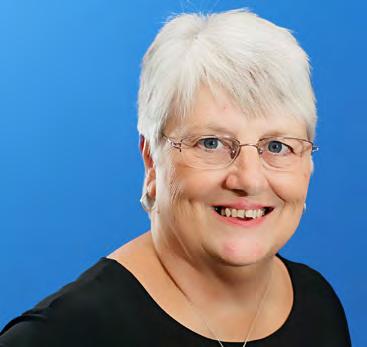
Shirlene Luebbers has been appointed Senior Vice President and Chief Operations Officer of the bank. Shirlene has been with the bank for 48 years, most of which has been in the bank’s operations and bookkeeping departments. Shirlene recently received the IBA Award of Excellence at the IBA Women in Banking Conference in 2024.
Anchor State Bank Names New Board of Director

Anchor State Bank has named Christopher (“Chris”) E. Crider, pictured left, Chief Executive
Officer, to the Board of Directors, succeeding James R. (”Jim”) Eckert, pictured right
Chris joined the bank as Vice PresidentLoans in August 2020, was promoted to President in January 2024, and became a director in February 2024. Jim, CEO and director since 1979, is

Debra Claypool has been appointed as the bank’s Senior Vice President and Chief Lending Officer. Deb has been with the bank for over 20 years and brings a wealth of lending knowledge to her new position. Before coming to Farmers State Bank, she also served as a loan officer at First National Bank in Centralia and Mercantile Bank of Belleville, IL.

Caroline Tate has been appointed the bank’s Senior Vice President and Chief Credit Officer.
Caroline has been with the bank for nearly 40 years and has overseen the bank’s credit risk management program for some time.

Shelby King has been appointed as the bank’s Senior Vice President and Chief Compliance Officer. Shelby has been with the bank for 10 years and has served as the bank’s Sr. Internal Auditor.
moving to a part time role as Executive Vice President in January 2025, in anticipation of his retirement, and will remain on the board of directors. The rest of the bank’s executive team is Karen S. Sandage, Vice President & Cashier; Erin E. Holderly, Controller, and Charlotte W. Martin, Vice President and Chief Risk Officer.

Adam Andrew Jahns (96) of Lake Geneva, WI, passed away peacefully on December 21, 2024. Adam was born in Chicago, IL on July 8, 1928, and raised by his parents Adam and Esther Jahns. He attended Reinburg Grade School and graduated from Foreman High School, class of 1946. During the Korean conflict, he served in the National Guard 33rd Infantry and as a Drum Major in the 566th Air Force Band. Adam earned a bachelor’s degree in accounting and business administration at Loyola University and completed a master’s degree in banking at Indiana University. In 1953, he married Virginia Wicklund of Oak Park, IL.
Adam began his banking career at Cragin Savings and Loan in Chicago which later became Cragin Federal Bank. Jahns held many positions over the years at Cragin and was the President and Chief Executive Officer for over 20 years then later became Chairman of the Board. He
was instrumental in growing the bank to twenty-seven branches and more than 650 employees. In 1993, the Bank was purchased by ABN Amro, a worldwide bank in the Netherlands that also owned LaSalle National Bank in Chicago.
Active in many banking industry organizations during his career, Adam Jahns was Chairman of the Board of the Illinois League of Financial Institutions, Chairman of the Chicago Area Council of Savings Institutions, Vice Chairman of the Federal Home Loan Bank of Chicago, Vice Chairman of LaSalle National Bank, Vice Chairman of Home Bank of Rockford, IL, and Advisory Board Member of the Federal Deposit Insurance Corporation. He served as a board member of the United States League of Community Banks, Verex Insurance Company, Real Estate Service Corporation, and Preferred Risk Insurance Company of Iowa. In his local community, Adam also served as a board member of the Williams Bay School District and Lake Geneva Water Safety Patrol.
Adam enjoyed time with family in Lake Geneva, WI, Fountain Hills,
AZ, Buena Vista, CO, and Boulder Junction, WI, as well as traveling throughout the United States and forty-seven countries. He and Virginia (Ginny) visited numerous missionary friends as they traveled.
Adam had been a member of Judson Baptist Church of Oak Park, IL and First Baptist Church of Elmhurst, IL. Since 1973, he has been an active and involved member of Calvary Community Church of Williams Bay, WI. He enjoyed singing in the church choirs and served in various church leadership roles.
Adam is survived by the love of his life, married for 71 years, Virginia (Ginny), and their loving children Linda (Frank) Eitmontas, Donna (DeWayne) Egly, Barbara (Dan) Martin, Marcia (Jeff) Hendrychs, and Brian (Angie) Jahns. He was extremely proud of and blessed by his ten grandchildren and twenty great grandchildren. Adam was also survived by his brother Richard (Sharon) Jahns, as well as nine nieces and nephews. He was preceded in death by his parents Adam and Esther Jahns and his sister Gloria (Frank) Rusk.

The Illinois Bankers Association recognizes Carol Jo Fritts, Chairperson of First Neighborhood Bancshares, Inc. a multi-bank holding company located in Toledo, IL as an inductee into the IBA’s 50-Year Club. The 50-Year Club recognizes and celebrates bankers who have achieved 50-plus years in the industry! A 50-Year Club nomination is a capstone event for a banker filled with rewarding experiences and achievements.
Carol Jo started her career at The First National Bank in Toledo as a teller and in 1988 she was named President and CEO. She led the company in forming a one bank holding company, First Neighborhood Bancshares, ESOP where she currently serves as the Chairperson.
Rick Catt retired as President/CEO of First Robinson Savings Bank effective November 30, 2024. Rick has served in this role since August 1, 1989.
Rick began his banking career at First National Bank of Oblong in 1974. During his 50-year tenure in banking, he has worked in practically every department in banking. Rick will remain on the bank’s board of directors. Pictured is Tim Robinson, IBA, left, presenting Rick with his 50 Year Club certificate.Photograph provided by In A Blink Photography.

After 16 years of service and 28 years in banking, Pat Donahue retired from Stillman Bank in December of 2024. Pat started with the bank in June 2008 as Senior Vice President.
Through his time at the bank, he demonstrated that he’s a community banker through and through, having responsibilities for multiple offices, business development, lending, and most recently, manager of the Oregon office.
Thank you, Pat, for your dedication and commitment to Stillman Bank and community banking!

A few Trustees surprised Erich for his retirement at the IBA board dinner on Wednesday, Dec. 5. Sitting L-R: Erich and Mary Bloxdorf, Angie and Chip Hasselbring, Dane and Kathleen Cleven, Kathy Marinangel. Standing L-R: T. J. Burge and Mike Mahorney.
Erich Bloxdorf, Executive Vice President and Chief Operating Officer of the Illinois Bankers Group Insurance Trust, retired from the Illinois Bankers Association (IBA) in December 2024. Bloxdorf joined the IBA in 2018 after a distinguished career spanning banking, technology, entrepreneurship, and the nonprofit sector.
Bloxdorf began his career in 1981 as a Management Trainee at The First National Bank of Springfield, gaining experience in operations, investments, trust services, commercial lending, and retail banking. He rose to roles including Assistant Vice President of Operations and Vice President/ Manager of Real Estate Lending. In 2001, he became Executive Vice President and CEO of Town and Country Banc Mortgage Services, later serving as its President, CEO, and Chair of the Board. In 2003, he was appointed President and
CEO of Town and Country Bank of Springfield, achieving his goal of becoming a bank president. He also instructed the ABA’s Principles of Banking course and graduated with honors from the Illinois Bankers Graduate School of Banking and the National Commercial Lending School.
From 1995 to 2001, Bloxdorf worked at Levi, Ray & Shoup, Inc., a global technology firm, managing marketing and strategic partnerships. In 2005, he was named the first CEO of The Real Estate Group, Inc., where he developed multiple revenue streams and founded Cornerstone Title Groupe LLC. He also served as COO of Rate Pilot, Inc., an internet startup, and secured over $2 million in startup capital.
In the nonprofit sector, Bloxdorf served as Executive Vice President of the Greater Springfield Chamber of Commerce from 2009 to 2011, contributing to the city’s rail
relocation project and later serving as interim President and CEO. In 2016, he became President and CEO of the Illinois League of Financial Institutions before joining the IBA in 2018 as COO and Plan Administrator of the Illinois Bankers Group Insurance Trust.
Bloxdorf's community involvement included serving in leadership roles for numerous organizations:
• Sangamon County Community Foundation: Board Member (2004–2011)
• Sangamo Club: Board Member (2009–2013)
• Economic Development Council: Chair (2005–2006)
• Greater Springfield Chamber of Commerce: Chair (2000)
• St. Agnes School Board: Chair (2001)
• St. Agnes Long Range Planning Committee: Chair (2000)
• Springfield Urban League: Treasurer and Board Member (1992–1996)
• Leadership Springfield: Chair (1994)
• American Heart Association: Board Member (1990–1992)
Bloxdorf’s greatest pride is his family. He’s been married to his wife Mary for 43 1/2 years. He also has two beautiful daughters, Corie Gillingham and Allie Wagner; and he is “Pappy” to five awesome grandchildren, Collins, Miller, Cora, Dax, and Cruz.
The IBA congratulates Erich Bloxdorf on a remarkable career and thanks him for his invaluable contributions.
Champaign, Illinois
Assets: $11.9 billion
Chair and CEO: Van Dukeman
No. of U.S. employees: 1,356
Giving back to the community is an important part of the culture at Busey Bank, which offers employees two paid hours of volunteer time each month. Combined, employees rack up nearly 20,000 volunteer hours each year, including more than 2,000 hours during National Volunteer Month in April.
Charitable donations are also a big part of giving back. On Fridays,
Oak Brook, Illinois
Assets: $1.5 billion
President and CEO: Darin Campbell
No. of U.S. employees: 197
Against a backdrop of high inflation and rising living costs, Evergreen Bank Group made a decision this year to absorb any increases in employees' health insurance premiums. It was "a way to alleviate" some of the financial burden on employees, President and CEO Darin Campbell said.
The bank also added pet insurance to its benefits offerings and instituted a mandatory time-off policy that requires all employees to take at least


staffers have the chance to wear jeans to work and donate $5 toward a worthy cause. Last year, Busey Bank, whose parent company is planning
to acquire CrossFirst Bankshares in Leawood, Kansas, raised $110,500 through the initiative.

one week away from work. During that week away, employees are barred from accessing any of the bank's
systems, which is a way of "pushing all employees to fully unplug," Campbell said.
Northbrook, Illinois
Assets: $1.9 billion
President and CEO: Eric Ephraim
No. of U.S. employees: 140
Employees at First Bank Chicago are immersed in a culture that's based on mutual respect and appreciation. New hires are welcomed with gifts and a chance to meet senior management. The onboarding program includes presentations by bank managers from across the company. There are a variety of learning and development
Des Plaines, Illinois
Assets: $502.3 million
President and CEO:
Nicholas Dizonno
No. of U.S. employees: 56
It is Millennium Bank's mission as a minority depository institution to provide financial services to minority, underserved or traditionally disadvantaged small business customers. The company is also committed to doing well by its employees. It recently expanded its health insurance options and increased the employer contribution to 80% for all employees and their families, as a way to help offset some of the premium costs. The
Rosemont, Illinois
Assets: $2 billion
President and CEO: Michael O'Rourke
No. of U.S. employees: 106
In order to improve internal communication, Signature Bank near Chicago has been hard at work this year building a new employee intranet. A multi-departmental team made up of technology, marketing, human resources and other banking staff has been leading the project.
"We believe developing this private network will have a positive impact for our employees by reducing the amount of emails they receive,
opportunities as employees progress in their careers, and transparency is achieved through regular strategic and financial updates and various newsletters.
The company offers a generous total employee benefits package, including a 401(k) and profit sharing plan with a $12,000 match, and a combination of hybrid work schedules and the ability

to work from a satellite office give employees flexibility as needed.

bank is also constantly updating its technology. It recently gave laptops to
most of its back-office employees to make it easier to work remotely.

ensuring they have access to the most current and accurate information and facilities teamwork by providing collaborative tools and platforms to work together,"
President and CEO Michael O'Rourke said. The site will also be a place for social interaction, feedback and recognition.
FEBRUARY
2025
2025
APRIL 2025 2/3
AUGUST 2025
2025

A personal invitation from Megan Collins, the IBA Annual Conference Committee Chair.

Illinois Banking Colleagues,
As the Chair of the IBA Annual Conference Committee, it is my pleasure to invite you to join us at the 2025 Annual Conference, a premier event designed to elevate our banking community and provide the best networking and professional development opportunities of the year! The conference will take place June 23-25, 2025, at the Grand Geneva Resort in Lake Geneva, Wisconsin.
This is an event I look forward to every year, and I’m excited to share why it’s so meaningful to me and why it should be a priority for you. For 133 years, the Illinois Bankers Association has been dedicated to uniting bankers, sharing knowledge, and addressing industry challenges.
Using your feedback, our committee is crafting an agenda that balances critical professional insights with engaging experiences—including keynote sessions, targeted breakouts, and CEO Roundtables for executive-level idea exchange—all designed to address the day-to-day needs of every banker. In addition to the educational programming, we’ll host the Vendor Marketplace where you can discover solutions to help your bank progress and succeed. This year's conference will also provide ample networking opportunities, allowing you to connect with banking professionals from across Illinois. These gatherings are essential for building and reinforcing relationships leading to new partnerships, collaborations, and friendships.
Attending this conference has been invaluable to me, and I’m confident you’ll find it just as rewarding. The collaborative spirit, depth of knowledge shared, and opportunities for growth and connection make it essential for professional development—a time to celebrate achievements, tackle challenges, and look ahead with optimism. While the Grand Geneva Resort & Spa offers a serene setting, it’s the exceptional program and attendee engagement that truly make this event special.
Registration is now open! Make plans to join us this summer in Lake Geneva and bring a guest. For more details and to register, reach out to IBA staff, scan the QR code, or visit illinois.bank/annual. I look forward to seeing you there!
Best regards,
SCAN TO REGISTER OR VISIT ILLINOIS.BANK
Megan M. Collins Senior Vice President, Market Executive Bank of America, N.A. Vice-Chair, Illinois Bankers Association Chair, IBA Annual Conference Committee
A review is conducted of your business continuity management program including best practices and simulated tabletop exercises. The audit will focus on management oversight, policies and procedures, staff training, and simulated tabletop exercises covering selected business interruptions.
A
